- Home
- Ann M. Martin
Rain Reign
Rain Reign Read online
The author and publisher have provided this e-book to you for your personal use only. You may not make this e-book publicly available in any way. Copyright infringement is against the law. If you believe the copy of this e-book you are reading infringes on the author’s copyright, please notify the publisher at: us.macmillanusa.com/piracy.
In memory of sweet Sadie,
March 11, 1998–October 7, 2013
Contents
Title Page
Copyright Notice
Dedication
I. The First Part
1. Who I Am—A Girl Named Rose (Rows)
2. My Dog, Rain (Reign, Rein)
3. The Rules of Homonyms
4. Some Things About My Father, Whose Name, Wesley Howard, Does Not Have a Homonym
5. When We Got Rain
6. Who I Wait For
7. Why I Don’t Ride the Bus
8. In My Classroom
9. Mrs. Leibler, Who Sits Next to Me
10. Anders Isn’t Following the Rules
11. When Rain Went to School
12. Some More About Homonyms
13. At the End of the Day
II. The Part About the Hurricane
14. The Storm on the Weather Channel
15. Where We Live
16. How to Get Ready for a Hurricane
17. Waiting
18. Storm Sounds
19. Rain Doesn’t Come When I Call
20. Why I Get Mad at My Father
21. Rain’s Nose
22. What Must Have Happened
III. The Next Part
23. Why My Father Gets Mad at Me
24. I Telephone Uncle Weldon
25. How to Look for a Lost Dog
26. Someone Calls Me Ma’am
27. My Story Is Such a Sad One
28. Riding with Uncle Weldon
29. What Not to Do When You Think of a New Homonym
30. Empty Space
31. The Good Phone Call
32. The Happy Tails Animal Shelter in Elmara, New York
33. What a Microchip Is
34. What Mrs. Caporale Says
IV. The Hard Part
35. The Thing I Have to Do
36. Mrs. Kushel’s Helpful Suggestions
37. Where Rain Used to Live
38. The General Store in Gloverstown
39. Found: Blond Female Dog
40. Parvani Finds a Homonym
41. My Father Makes a Mistake with Pronouns
42. Protecting Rain
43. What Mrs. Kushel Says
44. Good-bye
V. The Last Part
45. The Quiet House
46. My Father Has an Argument with His Brother
47. In the Middle of the Night
48. What Happened to My Mother
49. Hud Road
Author’s Note
Copyright
I
The First Part
1
Who I Am—A Girl Named Rose (Rows)
I am Rose Howard and my first name has a homonym. To be accurate, it has a homophone, which is a word that’s pronounced the same as another word but spelled differently. My homophone name is Rows.
Most people say homonym when they mean homophone. My teacher, Mrs. Kushel, says this is a common mistake.
“What’s the difference between making a mistake and breaking a rule?” I want to know.
“Making a mistake is accidental. Breaking a rule is deliberate.”
“But if—” I start to say.
Mrs. Kushel rushes on. “It’s all right to say ‘homonym’ when we mean ‘homophone.’ That’s called a colloquialism.”
“‘Breaking’ has a homonym,” I tell her. “‘Braking.’”
I like homonyms a lot. And I like words. Rules and numbers too. Here is the order in which I like these things:
1. Words (especially homonyms)
2. Rules
3. Numbers (especially prime numbers)
I’m going to tell you a story. It’s a true story, which makes it a piece of nonfiction.
This is how you tell a story: First you introduce the main character. I’m writing this story about me, so I am the main character.
My first name has a homonym, and I gave my dog a homonym name too. Her name is Rain, which is special because it has two homonyms—rein and reign. I will write more about Rain in Chapter Two. Chapter Two will be called “My Dog, Rain (Reign, Rein).”
Something important about the word write is that it has three homonyms—right, rite, and wright. That’s the only group of four homonyms I’ve thought of. If I ever think of another four-homonym group, it will be a red-letter day.
I live with my father, Wesley Howard, and neither of his names has a homonym.
From our porch you can see our front yard and our driveway and our road, which is called Hud Road. Road has two homonyms—rowed and rode. On the other side (sighed) of the road is a little forest, and through the trees you can see the New York Thruway. The word see has a homonym—sea. But even better, sees has two homonyms—seas and seize.
I’m in fifth grade at Hatford Elementary. There’s only one elementary school in Hatford, New York, and only one fifth-grade classroom in the school, and I’m in it. Most of my classmates are ten years old or about to turn eleven. I’m almost twelve because no one is sure what to do with me in school. I’ve stayed back for two semesters, which is a total of one year. (1/2 + 1/2 = 1.)
Some of the things I get teased about are following the rules and always talking about homonyms. Mrs. Leibler is my aide and she sits with me in Mrs. Kushel’s room. She sits in an adult-size chair next to my fifth-grade-size chair and rests her hand on my arm when I blurt something out in the middle of math. Or, if I whap myself in the head and start to cry, she’ll say, “Rose, do you need to step into the hall for a moment?”
Mrs. Leibler tells me that there are things worth talking about besides homonyms and rules and prime numbers. She encourages me to think up conversation starters. Some conversation starters about me that do not have anything to do with homonyms or rules or prime numbers are:
I live in a house that faces northeast. (After I say that, I ask the person I’m trying to have a conversation with, “And which direction does your house face?”)
Down the road, 0.7 miles from my house is the J & R Garage, where my father sometimes works as a mechanic, and 0.1 miles farther along is a bar called The Luck of the Irish, where my father goes after work. There is nothing between my house and the J & R Garage except trees and the road. (Tell me some things about your neighborhood.)
I have an uncle named Weldon, who is my father’s younger brother. (And who else is in your family?)
My official diagnosis is high-functioning autism, which some people call Asperger’s syndrome. (Do you have a diagnosis?)
I will finish up this part of my introduction by telling you that my mother does not live with my father and me. She ran away from our family when I was two. Therefore, the people living in my house are my father and me. The dog living in our house is Rain. Uncle Weldon lives 3.4 miles away on the other side of Hatford.
The next part of my introduction is the setting of my story. I’ve already told you my geographic location—Hud Road in Hatford, New York. The historical moment in time in which this story begins is October of my year in fifth grade.
Now I will tell you something troubling about fifth grade. It isn’t as troubling as what happens later in the story when my father lets Rain outside during a hurricane, but it is still troubling. For the first time in my life I’m being sent home with weekly progress reports that I have to give to my father. The reports are written by Mrs. Leibler and read and signed by Mrs. Kushel, which is my teachers’ way of saying that they’re in agreement
about my behavior. The reports list all of my notable behaviors for Monday through Friday. Some of the comments are nice, such as the ones about when I participate appropriately in a classroom discussion. But most of the comments make my father slam the reports onto the table and say, “Rose, for god’s sake, keep your mouth closed when you think of a homonym,” or, “Do you see any of the other kids clapping their hands over their ears and screaming when they hear the fire alarm?”
In the last report Mrs. Leibler and Mrs. Kushel asked my father to schedule monthly meetings with them. Now he’s supposed to go to Hatford Elementary on the third Friday of every month at 3:45 p.m. to discuss me. This is what he said when he read that: “I don’t have time for meetings. This is way too much trouble, Rose. Why do you do these things?” He said that at 3:48 p.m. on a Friday when there was no work for him at the J & R Garage.
Uncle Weldon heard about the monthly meetings on October 3rd at 8:10 in the evening when he was visiting my father and Rain and me.
My father was standing at the front door, holding the letter in his hand and gazing out at the trees and the darkness. “These meetings are crap,” he said.
Uncle Weldon, who was sitting at the Formica kitchen table with me, looked at my father from under his eyelashes and said, “I could go, if you want.” Uncle Weldon has a very soft voice.
My father whipped around and pointed his finger at Weldon. “No! Rose is my responsibility. I can take care of things.”
Weldon lowered his head and didn’t answer. But when my father turned around so that he was facing outside again, my uncle held up two crossed fingers, which was his signal to me that everything would be all right (write, rite, wright). I held up my fingers too (two, to), and we each touched our hearts with them.
After that, Rain came into the kitchen and sat on my feet for a while.
Then my uncle left.
Then my father crumpled the letter from Mrs. Leibler and Mrs. Kushel and tossed it into the yard.
That is the end of the introduction to me.
2
My Dog, Rain (Reign, Rein)
The next character in my true story is Rain. A character doesn’t have to be a human being; a character can be an animal, such as a dog named Rain.
Rain weighs 23 pounds. This is how you weigh a dog: You stand on the scales and weigh yourself. Then you pick up the dog and weigh yourself and the dog together. Then you subtract your weight from the weight of you and the dog together, and that’s how much the dog weighs.
(Weigh and way are homonyms.)
Rain’s back is 18 inches long. From the tip of her nose to the tip of her tail she’s 34 inches long.
Rain’s fur is mostly yellow. Seven of her toes are white—two on her right front paw, one on her left front paw, three on her right back paw, and one on her left back paw. Her right ear has brown speckles on it. Her fur is short. Uncle Weldon says she looks sort of like a yellow Labrador retriever. Since a female purebred yellow Lab should weigh 55–70 pounds, Rain is probably not a purebred yellow Lab.
When Rain and I are at home alone together, we sit inside or on the front porch and Rain puts one (won) of her front feet (feat) in (inn) my lap. I rub her toes (tows), and she gazes into my blue (blew) eyes with her eyes, which are the color of a chocolate bar. After a while, she starts to fall asleep. Her brown eyes squint shut until they’re completely closed. At bedtime she crawls under the covers with me. If I wake up during the night, I find that Rain has smashed her body against mine and rested her head across my neck.
Rain’s breath smells like dog food.
Rain has lived with us for 11 months, which is almost one year. I will tell you more about the night my father brought her home in another chapter, Chapter Five, which will be called “When We Got Rain.”
Rain and I have routines. We like routines. Rain stays at home alone on weekdays while I’m at Hatford Elementary and my father is at his job at the J & R Garage. When there isn’t any work for my father at the J & R Garage, he usually goes to The Luck of the Irish where he drinks beer and watches television. One way or the other, he isn’t at home. Rain stays in the house by herself. At 2:42 when school ends, Uncle Weldon picks me up. Then he drives me home. He drops me off between 2:58 and 3:01. Rain and I sit on the porch for a while and I rub her toes. Then we take a walk. Then I do my homework. Then I start dinner for my father and me. Then I feed Rain.
What Rain eats is My Pet dog food from a can—half a can in the morning and half a can in the evening—mixed with My Pet dry food. When my father first brought Rain home he said she didn’t need wet food, which is more expensive than dry food, but I said that dogs in the wild eat meat, and my father said, “You’re right, Rose.”
After Rain’s dinner we wait for my father to come home. If he’s been at The Luck of the Irish all day, he might not be in a good mood. Or he might be in a very good mood. If he’s been working at the J & R Garage, he might not be in a good mood. Or he might be in no particular mood.
Rain is smart. She never goes near my father right away. She stands in the doorway to my bedroom while we wait to see whether my father will say, “What’s for supper?” If he says, “What’s for supper?” then it’s safe for me to serve him and for Rain to sit by the table while we eat. She can stare at us and put her paws in our laps wanting food until I see my father’s eyes get black and hard and that’s the signal that Rain should go back to my bedroom.
If my father comes home and doesn’t say anything, but walks into his own room, then Rain and I should not go near him at all. And I have to make Rain stay very quiet so she doesn’t annoy him or give him a headache.
Rain knows (nose) to (two, too) stay away from my father’s feet (feat) and his shoes (shoos).
3
The Rules of Homonyms
I am the only student in my classroom who’s interested in homonyms. This suggests to me that most kids are not interested in homonyms. So if you want to skip this chapter, it’s all right.
But if you read it, you might get interested in homonyms.*
*If you are not interested in homonyms at all, stop reading here and skip to Chapter Four.
Homonyms can be surprising and fun, and that’s why I started a list of them. The list is very long. Right now it takes up four sheets of paper. The words are in alphabetical order. I try to leave space between the pairs and trios of homonyms so that I can add new ones to the list easily. But if the spaces have gotten used up and I’ve thought of another set of homonyms, then I have to rewrite the list from that point on. Sometimes this makes me cry because I have to write the words perfectly, without making any mistakes. If I make a mistake I have to start over. Josh Bartel, who is a 4'10" boy in my classroom, said to me last week, “Rose, just keep the list in your computer. Then you can add in new words wherever you want. The computer will make spaces for you. You won’t have to keep rewriting the list.”
But my father and I do not have a computer. Or a cell phone or a digital camera or an iPod or a DVD player. My father says those things are expensive and unnecessary. He says we can’t afford them, and who needs them anyway?
So my homonyms list is on paper.
In this chapter I’m going to tell you about my rules for homonyms. But since I’ve realized that most kids aren’t any more interested in rules than they are in homonyms, I’ll tell you something fun about homonyms first. Then I’ll get to the rules, and if you’re still interested you can keep reading.
What’s fun about homonyms is hearing a word in a sentence and suddenly realizing that it has a homonym, or maybe two (or three, but that’s so rare that I don’t often think about homonym quartets), and that you haven’t thought of that homonym pair or trio before. For instance, yesterday, Uncle Weldon said to me, “Look how carefully Rain chews her food.” And just like that I had a new pair of homonyms to add to my list.
Uncle Weldon and I were sitting at my kitchen table when he said that, and I jumped out of my chair and cried, “Oh! ‘Chews’ and ‘choose’
! That’s a new homonym pair!”
Uncle Weldon gets excited about homonyms too, so he said, “Wonderful, Rose. Go find your list. Let’s see if there’s room for two more words.”
While I was getting the list out of my backpack, I thought about the word chew and how it rhymes with brew and as I ran back to Uncle Weldon I began to shout again. “And also there’s ‘brews’ and ‘bruise’! Oh, that’s a really good pair! Two new pairs to add to my list! This is almost a red-letter day.”
So, in conclusion, that is what’s fun about homonyms.*
*If you’ve heard enough about homonyms and you don’t want to learn my rules, stop reading here and skip to Chapter Four.
Now, here are my rules of homonyms. It’s important to have rules, because without them, you could get overwhelmed thinking of words that sound alike. Your list would be pages and pages and pages long. The purpose of most of my rules is to limit homonyms to words that are pure and also that are English.
ROSE HOWARD’S RULES OF HOMONYMS
1. A true pair or trio of homonyms includes no proper nouns. A proper noun names a particular person or place or thing, such as Josh Bartel or Hatford or Rice Krispies cereal. I thought about including coax and Cokes and herald and Harold on my list, but Cokes and Harold are proper nouns, not pure words. Including proper nouns would make my list too long. Luckily, Rose and Rain are proper nouns and regular nouns, so I was able to include them on my list.
2. A true pair or trio of homonyms includes no foreign words. I put the words peek and peak on my list, but I did not add pique for a trio, because pique is a word of French origin. Including foreign words on my list would become very difficult, because I don’t know all the languages.
3. A true pair or trio of homonyms includes no contractions. Isle and aisle are on my list, but I didn’t add I’ll because it’s actually a contraction of the words I will. Therefore it doesn’t count as a pure word. (Besides, I is a proper noun.)
4. A true pair or trio of homonyms includes no abbreviated words. I did not add ink and inc. to my list because inc. is short for incorporated, which is clearly not a homonym for ink.

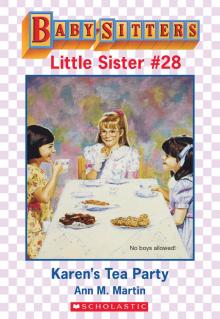 Karen's Tea Party
Karen's Tea Party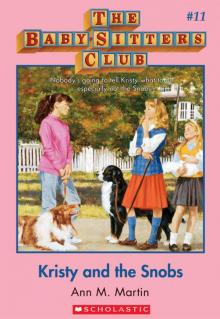 Kristy and the Snobs
Kristy and the Snobs Best Kept Secret
Best Kept Secret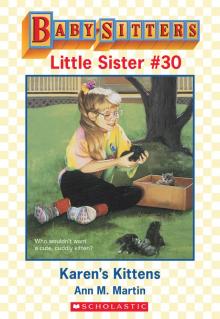 Karen's Kittens
Karen's Kittens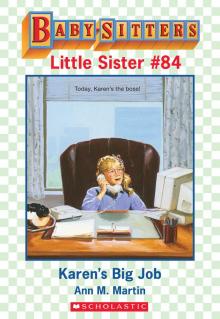 Karen's Big Job
Karen's Big Job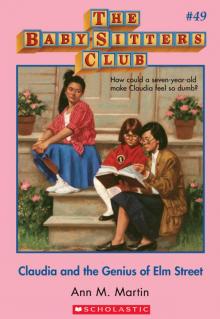 Claudia and the Genius of Elm Street
Claudia and the Genius of Elm Street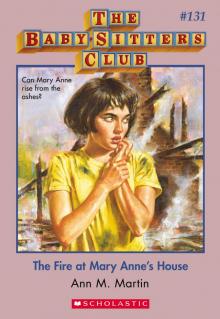 The Fire at Mary Anne's House
The Fire at Mary Anne's House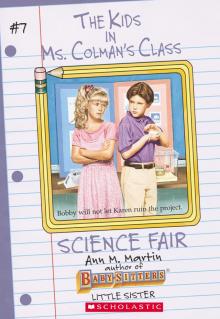 Science Fair
Science Fair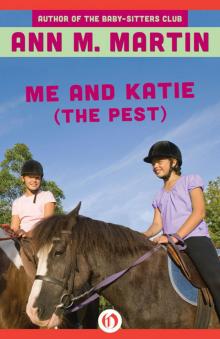 Me and Katie (The Pest)
Me and Katie (The Pest)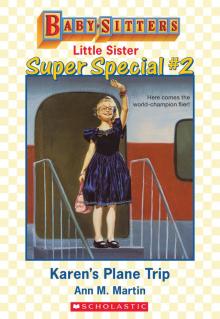 Karen's Plane Trip
Karen's Plane Trip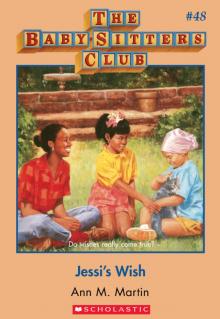 Jessi's Wish
Jessi's Wish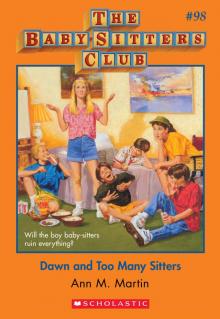 Dawn and Too Many Sitters
Dawn and Too Many Sitters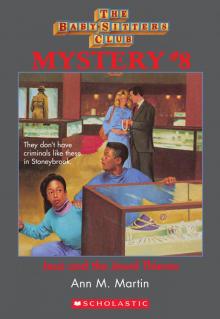 Jessi and the Jewel Thieves
Jessi and the Jewel Thieves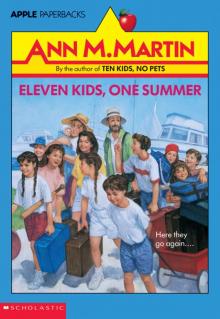 Eleven Kids, One Summer
Eleven Kids, One Summer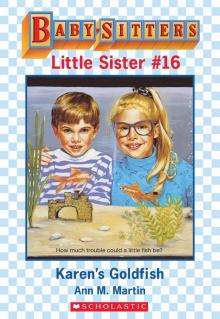 Karen's Goldfish
Karen's Goldfish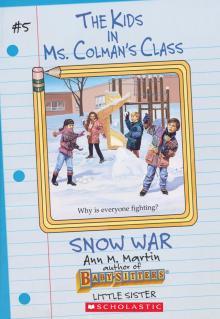 Snow War
Snow War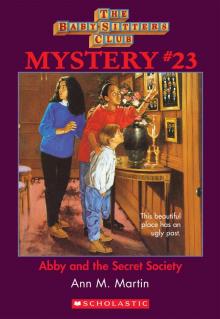 Abby and the Secret Society
Abby and the Secret Society Keeping Secrets
Keeping Secrets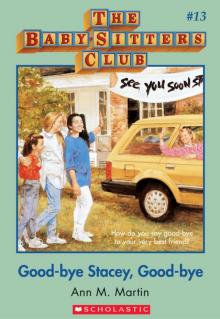 Good-Bye Stacey, Good-Bye
Good-Bye Stacey, Good-Bye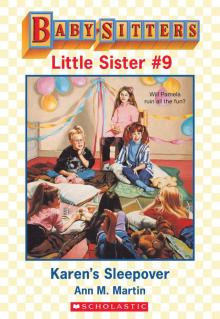 Karen's Sleepover
Karen's Sleepover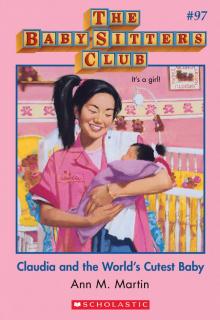 Claudia and the World's Cutest Baby
Claudia and the World's Cutest Baby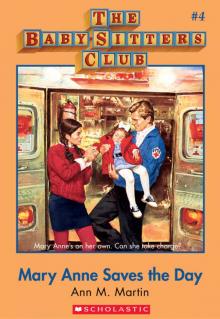 Mary Anne Saves the Day
Mary Anne Saves the Day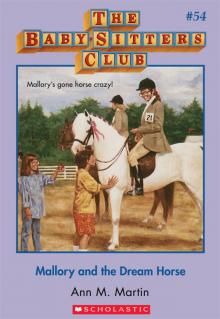 Mallory and the Dream Horse
Mallory and the Dream Horse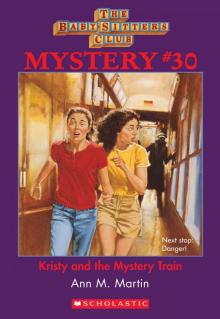 Kristy and the Mystery Train
Kristy and the Mystery Train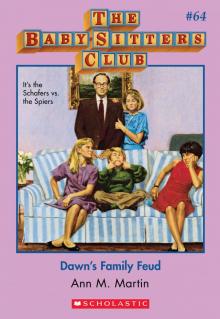 Dawn's Family Feud
Dawn's Family Feud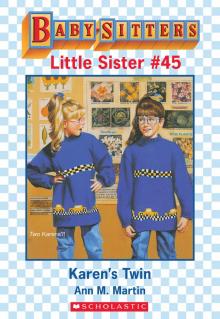 Karen's Twin
Karen's Twin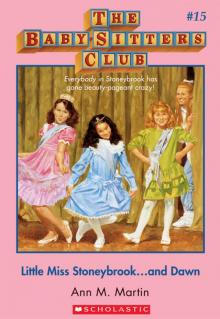 Little Miss Stoneybrook... And Dawn
Little Miss Stoneybrook... And Dawn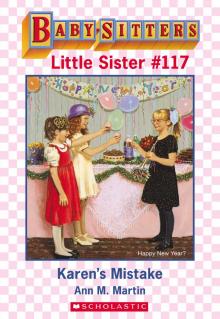 Karen's Mistake
Karen's Mistake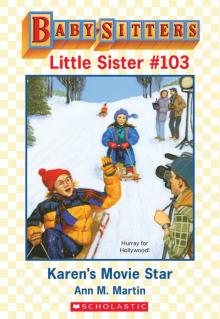 Karen's Movie Star
Karen's Movie Star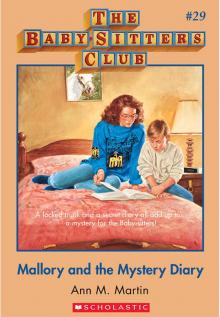 Mallory and the Mystery Diary
Mallory and the Mystery Diary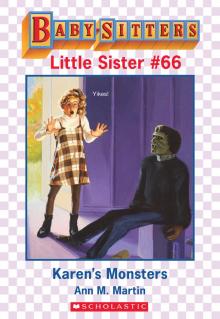 Karen's Monsters
Karen's Monsters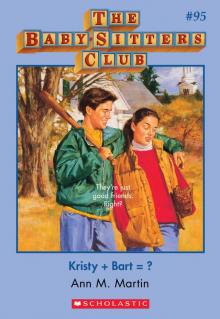 Kristy + Bart = ?
Kristy + Bart = ?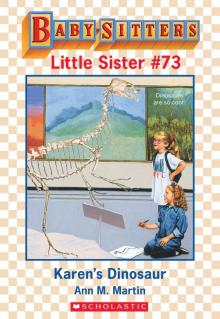 Karen's Dinosaur
Karen's Dinosaur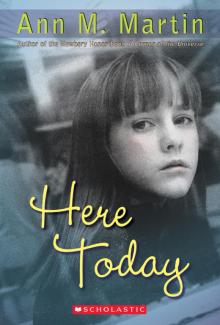 Here Today
Here Today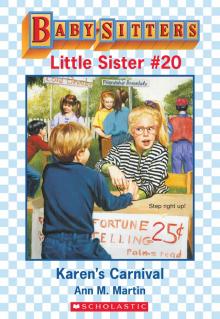 Karen's Carnival
Karen's Carnival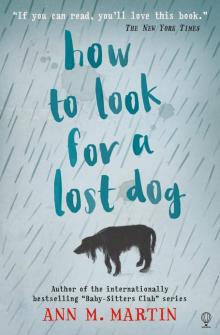 How to Look for a Lost Dog
How to Look for a Lost Dog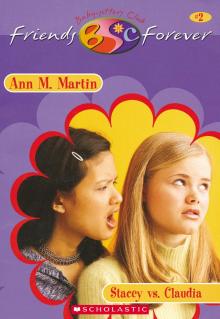 Stacey vs. Claudia
Stacey vs. Claudia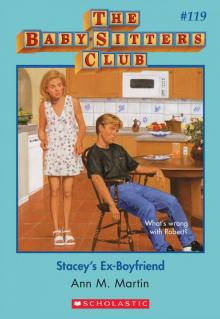 Stacey's Ex-Boyfriend
Stacey's Ex-Boyfriend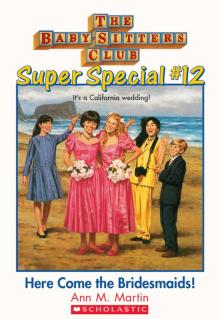 Here Come the Bridesmaids!
Here Come the Bridesmaids! Graduation Day
Graduation Day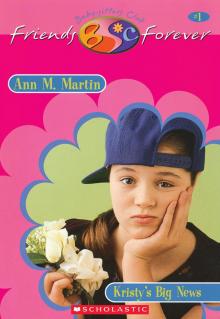 Kristy's Big News
Kristy's Big News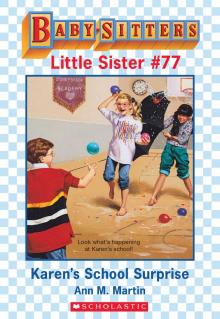 Karen's School Surprise
Karen's School Surprise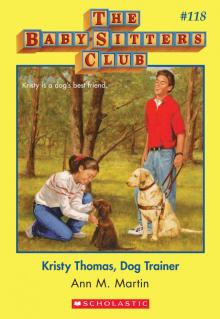 Kristy Thomas, Dog Trainer
Kristy Thomas, Dog Trainer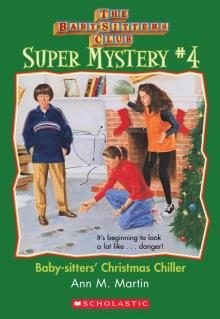 Baby-Sitters' Christmas Chiller
Baby-Sitters' Christmas Chiller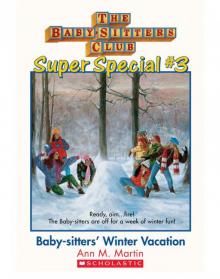 Baby-Sitters' Winter Vacation
Baby-Sitters' Winter Vacation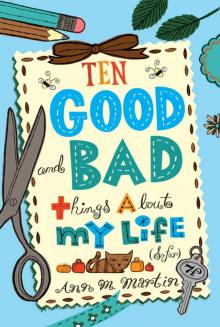 Ten Good and Bad Things About My Life
Ten Good and Bad Things About My Life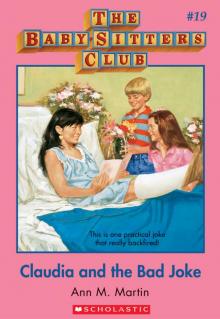 Claudia and the Bad Joke
Claudia and the Bad Joke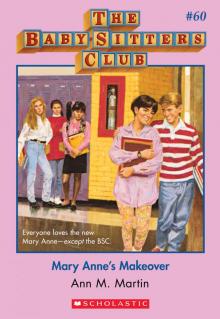 Mary Anne's Makeover
Mary Anne's Makeover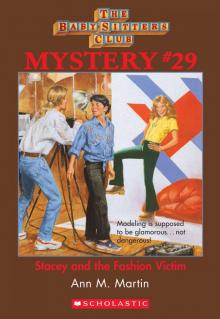 Stacey and the Fashion Victim
Stacey and the Fashion Victim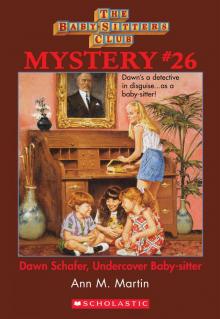 Dawn Schafer, Undercover Baby-Sitter
Dawn Schafer, Undercover Baby-Sitter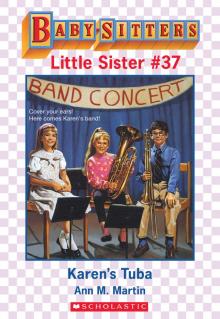 Karen's Tuba
Karen's Tuba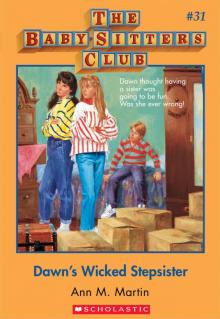 Dawn's Wicked Stepsister
Dawn's Wicked Stepsister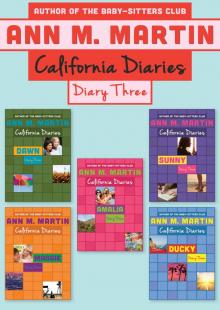 Diary Three: Dawn, Sunny, Maggie, Amalia, and Ducky
Diary Three: Dawn, Sunny, Maggie, Amalia, and Ducky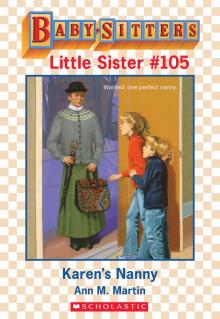 Karen's Nanny
Karen's Nanny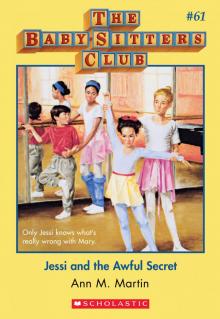 Jessi and the Awful Secret
Jessi and the Awful Secret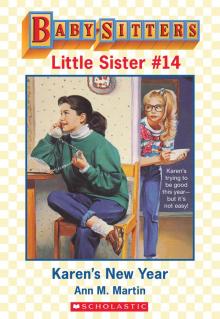 Karen's New Year
Karen's New Year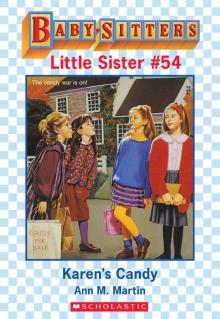 Karen's Candy
Karen's Candy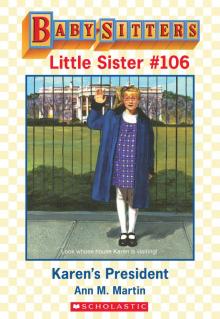 Karen's President
Karen's President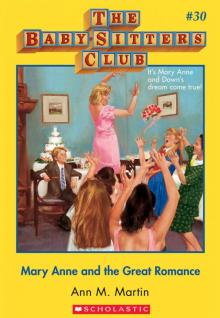 Mary Anne and the Great Romance
Mary Anne and the Great Romance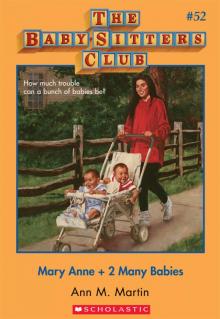 Mary Anne + 2 Many Babies
Mary Anne + 2 Many Babies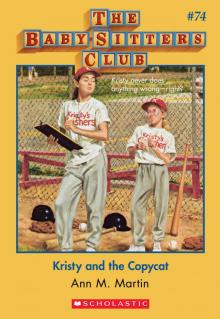 Kristy and the Copycat
Kristy and the Copycat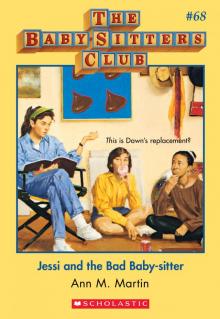 Jessi and the Bad Baby-Sitter
Jessi and the Bad Baby-Sitter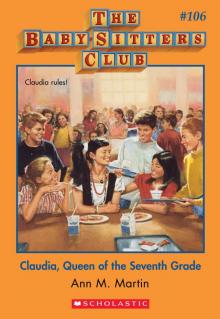 Claudia, Queen of the Seventh Grade
Claudia, Queen of the Seventh Grade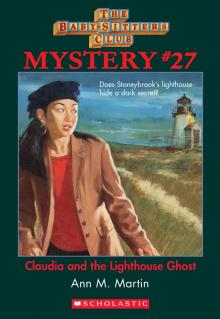 Claudia and the Lighthouse Ghost
Claudia and the Lighthouse Ghost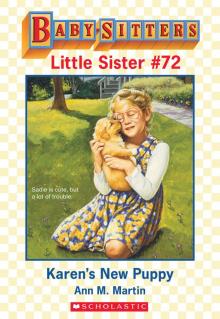 Karen's New Puppy
Karen's New Puppy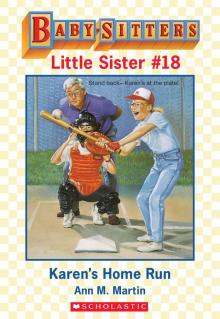 Karen's Home Run
Karen's Home Run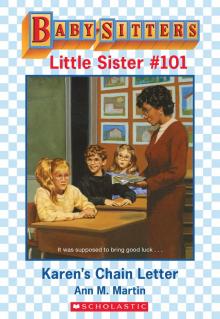 Karen's Chain Letter
Karen's Chain Letter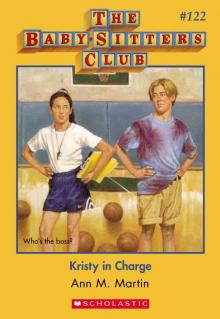 Kristy in Charge
Kristy in Charge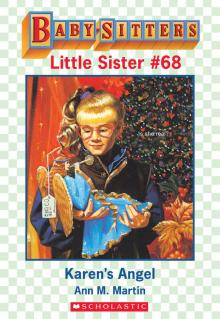 Karen's Angel
Karen's Angel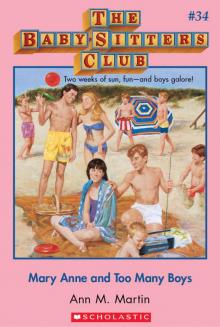 Mary Anne and Too Many Boys
Mary Anne and Too Many Boys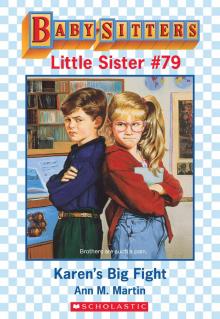 Karen's Big Fight
Karen's Big Fight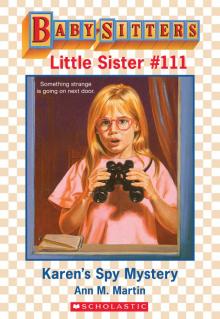 Karen's Spy Mystery
Karen's Spy Mystery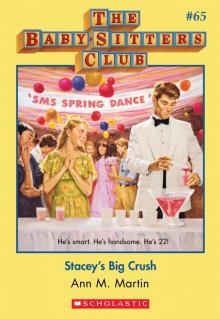 Stacey's Big Crush
Stacey's Big Crush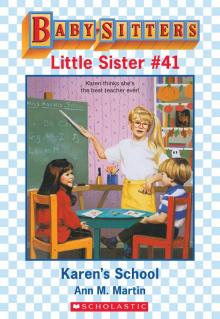 Karen's School
Karen's School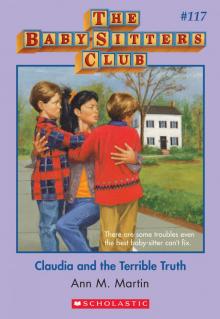 Claudia and the Terrible Truth
Claudia and the Terrible Truth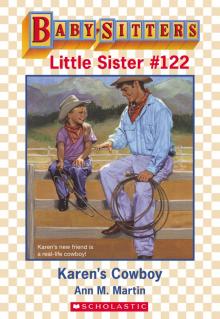 Karen's Cowboy
Karen's Cowboy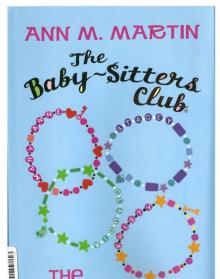 The Summer Before
The Summer Before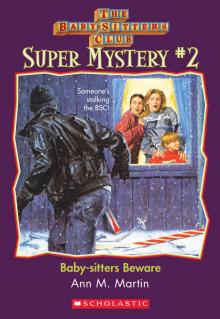 Beware, Dawn!
Beware, Dawn!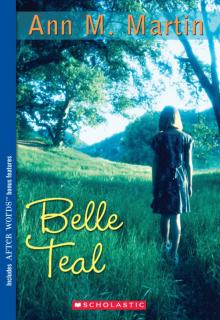 Belle Teale
Belle Teale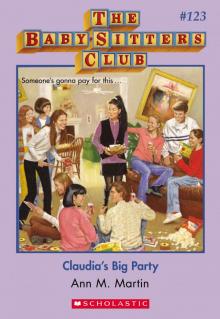 Claudia's Big Party
Claudia's Big Party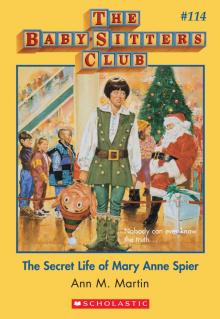 The Secret Life of Mary Anne Spier
The Secret Life of Mary Anne Spier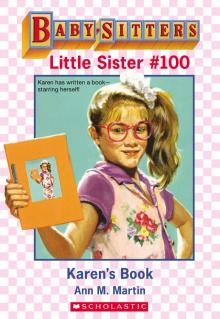 Karen's Book
Karen's Book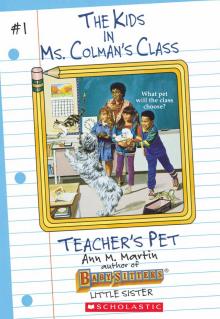 Teacher's Pet
Teacher's Pet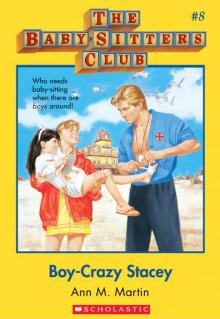 Boy-Crazy Stacey
Boy-Crazy Stacey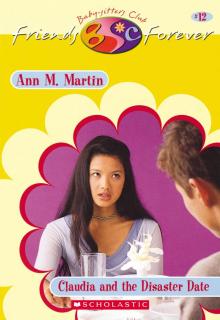 Claudia and the Disaster Date
Claudia and the Disaster Date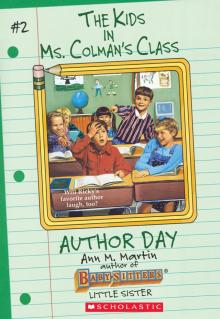 Author Day
Author Day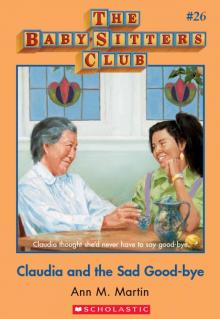 Claudia and the Sad Good-Bye
Claudia and the Sad Good-Bye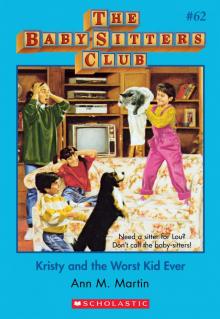 Kristy and the Worst Kid Ever
Kristy and the Worst Kid Ever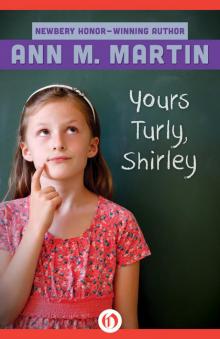 Yours Turly, Shirley
Yours Turly, Shirley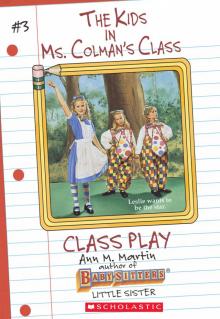 Class Play
Class Play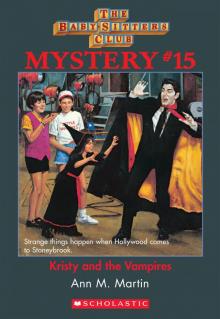 Kristy and the Vampires
Kristy and the Vampires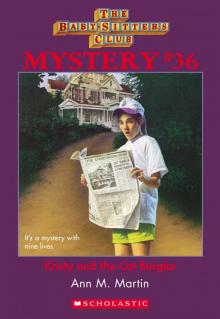 Kristy and the Cat Burglar
Kristy and the Cat Burglar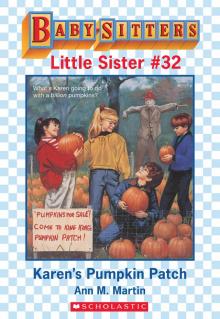 Karen's Pumpkin Patch
Karen's Pumpkin Patch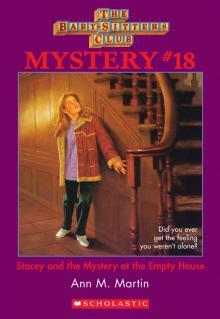 Stacey and the Mystery at the Empty House
Stacey and the Mystery at the Empty House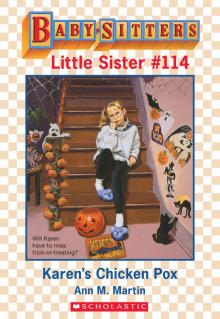 Karen's Chicken Pox
Karen's Chicken Pox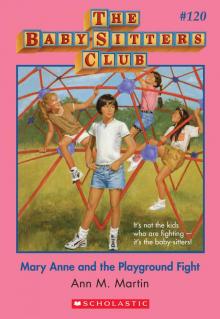 Mary Anne and the Playground Fight
Mary Anne and the Playground Fight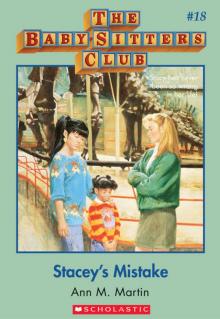 Stacey's Mistake
Stacey's Mistake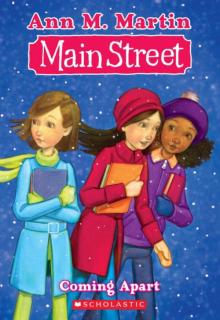 Coming Apart
Coming Apart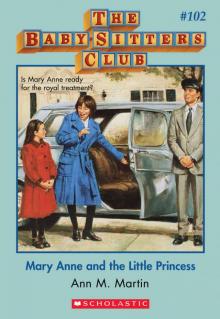 Mary Anne and the Little Princess
Mary Anne and the Little Princess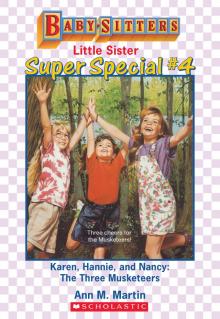 Karen, Hannie and Nancy: The Three Musketeers
Karen, Hannie and Nancy: The Three Musketeers 'Tis the Season
'Tis the Season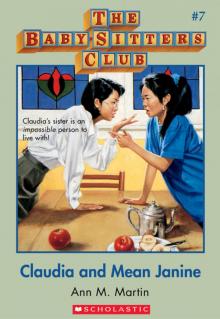 Claudia and Mean Janine
Claudia and Mean Janine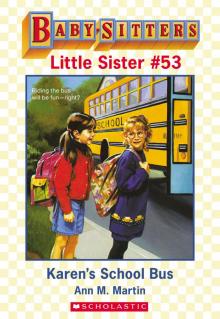 Karen's School Bus
Karen's School Bus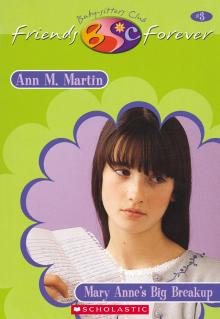 Mary Anne's Big Breakup
Mary Anne's Big Breakup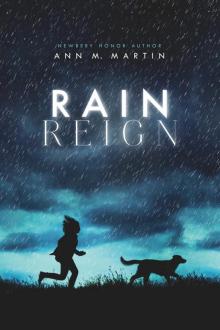 Rain Reign
Rain Reign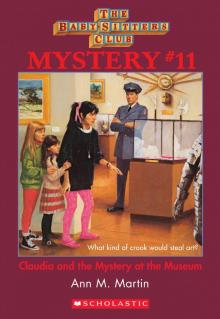 Claudia and the Mystery at the Museum
Claudia and the Mystery at the Museum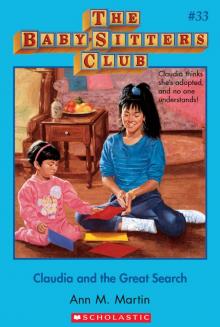 Claudia and the Great Search
Claudia and the Great Search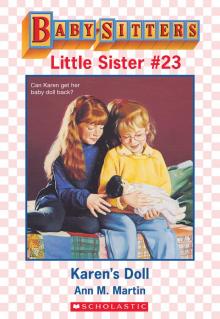 Karen's Doll
Karen's Doll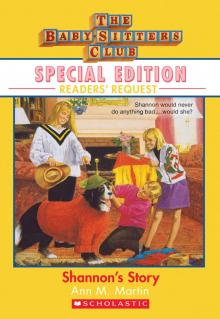 Shannon's Story
Shannon's Story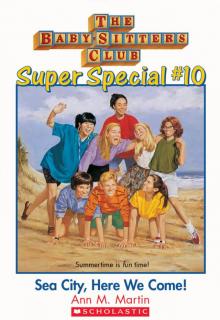 Sea City, Here We Come!
Sea City, Here We Come!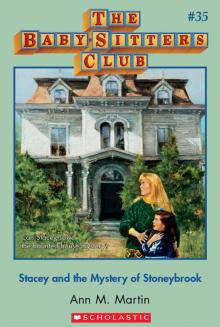 Stacey and the Mystery of Stoneybrook
Stacey and the Mystery of Stoneybrook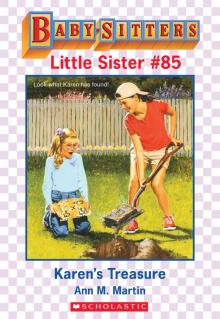 Karen's Treasure
Karen's Treasure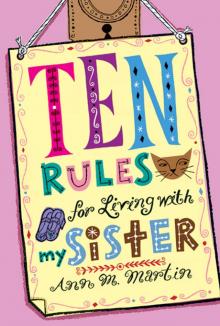 Ten Rules for Living With My Sister
Ten Rules for Living With My Sister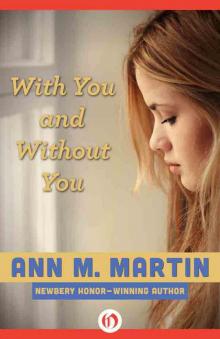 With You and Without You
With You and Without You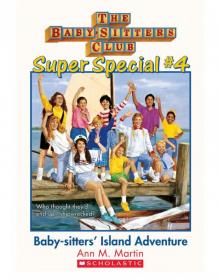 Baby-Sitters' Island Adventure
Baby-Sitters' Island Adventure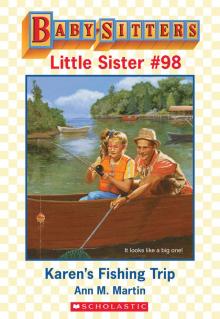 Karen's Fishing Trip
Karen's Fishing Trip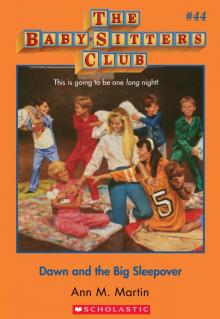 Dawn and the Big Sleepover
Dawn and the Big Sleepover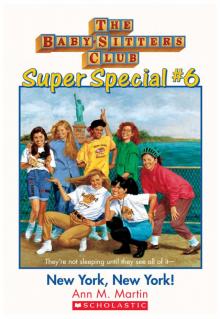 New York, New York!
New York, New York!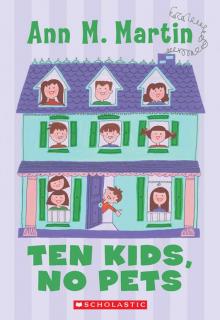 Ten Kids, No Pets
Ten Kids, No Pets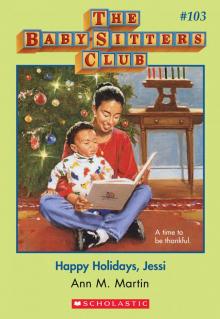 Happy Holidays, Jessi
Happy Holidays, Jessi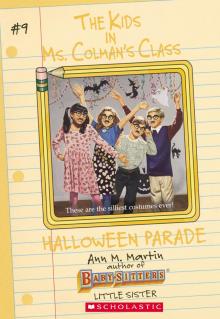 Halloween Parade
Halloween Parade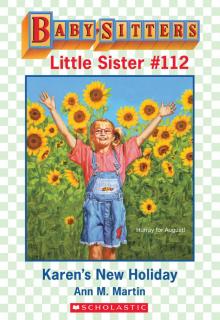 Karen's New Holiday
Karen's New Holiday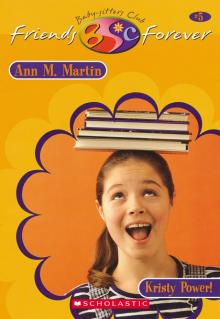 Kristy Power!
Kristy Power!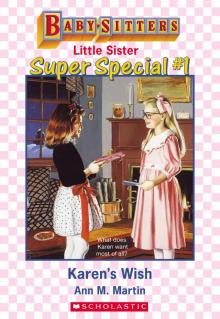 Karen's Wish
Karen's Wish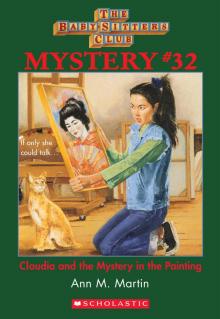 Claudia and the Mystery in the Painting
Claudia and the Mystery in the Painting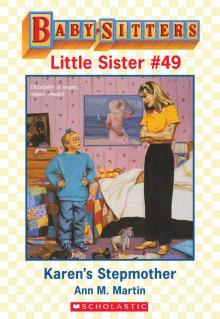 Karen's Stepmother
Karen's Stepmother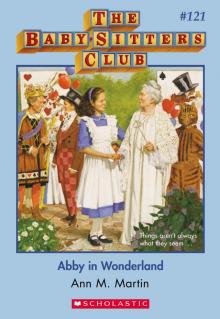 Abby in Wonderland
Abby in Wonderland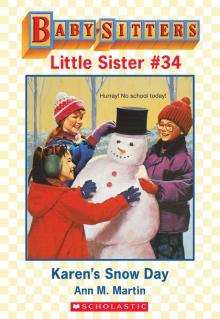 Karen's Snow Day
Karen's Snow Day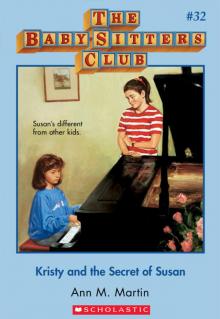 Kristy and the Secret of Susan
Kristy and the Secret of Susan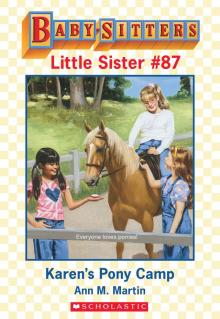 Karen's Pony Camp
Karen's Pony Camp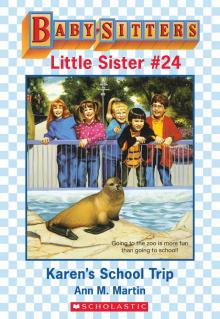 Karen's School Trip
Karen's School Trip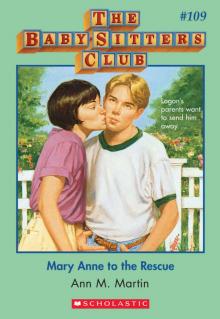 Mary Anne to the Rescue
Mary Anne to the Rescue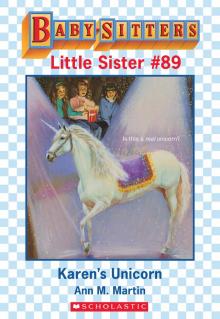 Karen's Unicorn
Karen's Unicorn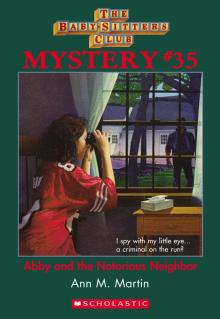 Abby and the Notorious Neighbor
Abby and the Notorious Neighbor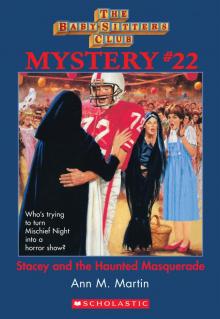 Stacey and the Haunted Masquerade
Stacey and the Haunted Masquerade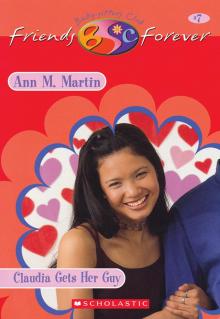 Claudia Gets Her Guy
Claudia Gets Her Guy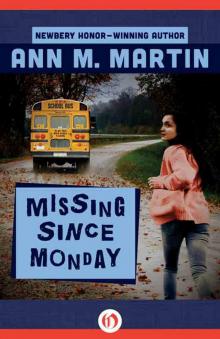 Missing Since Monday
Missing Since Monday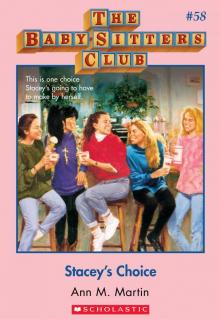 Stacey's Choice
Stacey's Choice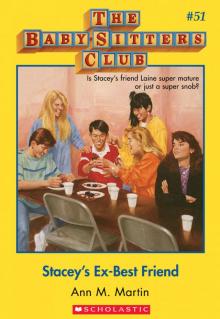 Stacey's Ex-Best Friend
Stacey's Ex-Best Friend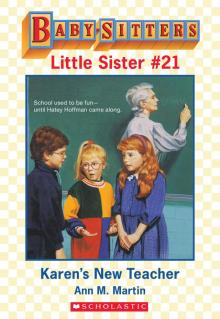 Karen's New Teacher
Karen's New Teacher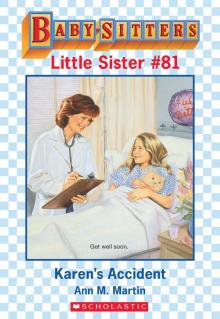 Karen's Accident
Karen's Accident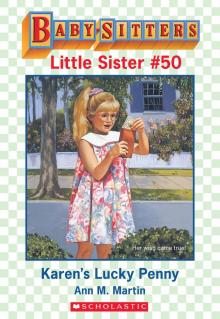 Karen's Lucky Penny
Karen's Lucky Penny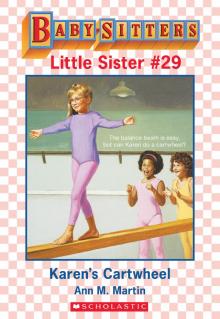 Karen's Cartwheel
Karen's Cartwheel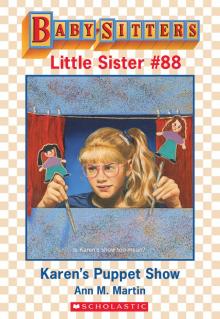 Karen's Puppet Show
Karen's Puppet Show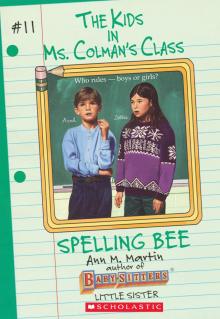 Spelling Bee
Spelling Bee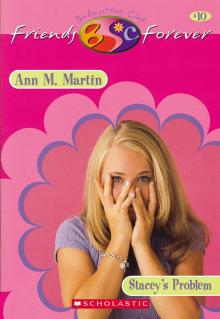 Stacey's Problem
Stacey's Problem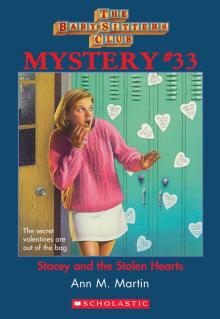 Stacey and the Stolen Hearts
Stacey and the Stolen Hearts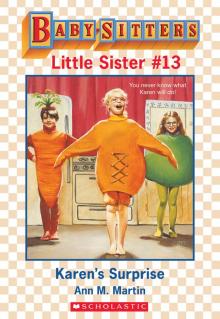 Karen's Surprise
Karen's Surprise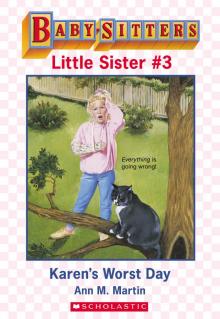 Karen's Worst Day
Karen's Worst Day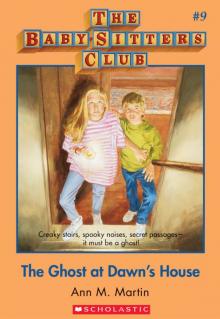 The Ghost at Dawn's House
The Ghost at Dawn's House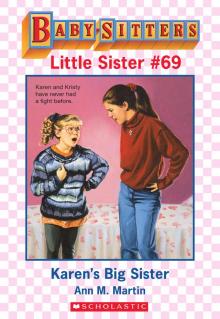 Karen's Big Sister
Karen's Big Sister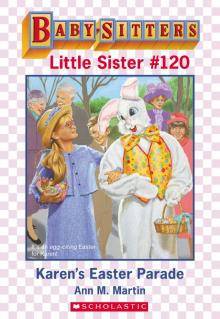 Karen's Easter Parade
Karen's Easter Parade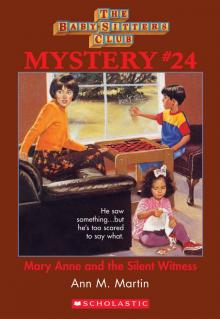 Mary Anne and the Silent Witness
Mary Anne and the Silent Witness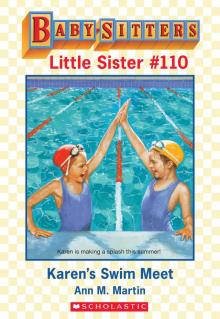 Karen's Swim Meet
Karen's Swim Meet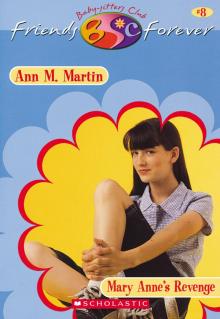 Mary Anne's Revenge
Mary Anne's Revenge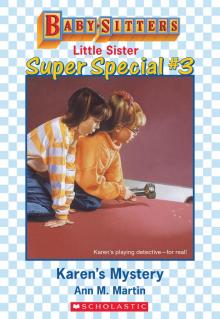 Karen's Mystery
Karen's Mystery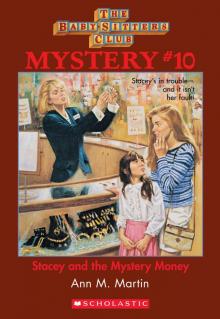 Stacey and the Mystery Money
Stacey and the Mystery Money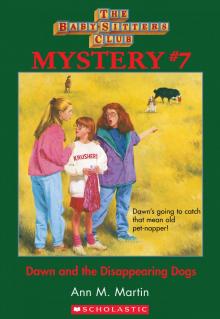 Dawn and the Disappearing Dogs
Dawn and the Disappearing Dogs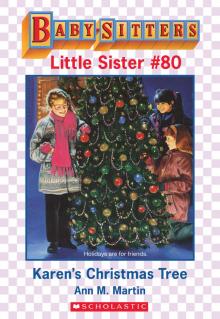 Karen's Christmas Tree
Karen's Christmas Tree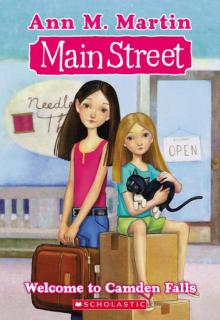 Welcome to Camden Falls
Welcome to Camden Falls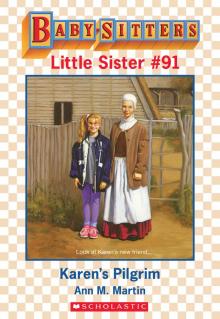 Karen's Pilgrim
Karen's Pilgrim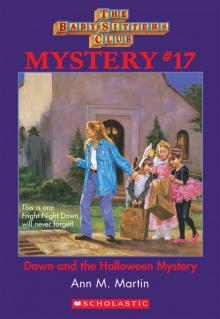 Dawn and the Halloween Mystery
Dawn and the Halloween Mystery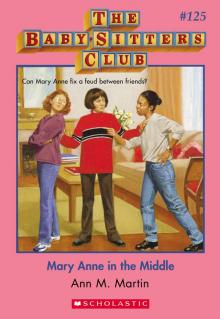 Mary Anne in the Middle
Mary Anne in the Middle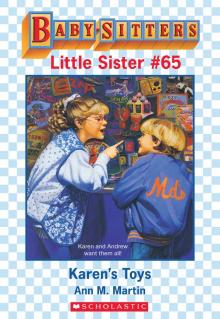 Karen's Toys
Karen's Toys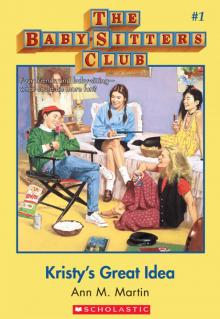 Kristy's Great Idea
Kristy's Great Idea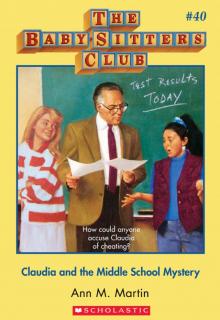 Claudia and the Middle School Mystery
Claudia and the Middle School Mystery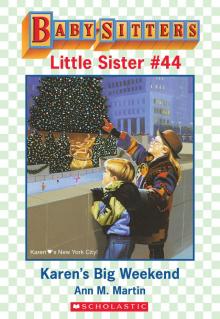 Karen's Big Weekend
Karen's Big Weekend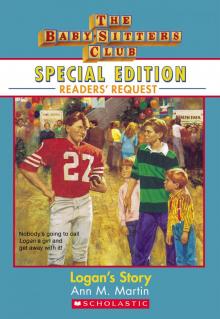 Logan's Story
Logan's Story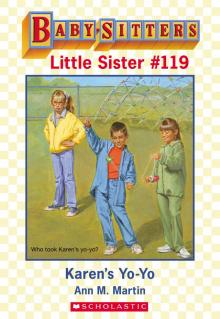 Karen's Yo-Yo
Karen's Yo-Yo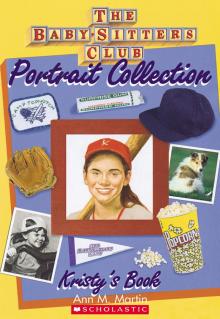 Kristy's Book
Kristy's Book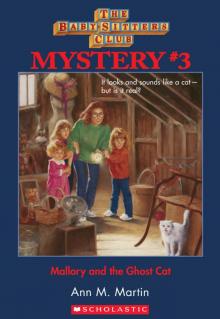 Mallory and the Ghost Cat
Mallory and the Ghost Cat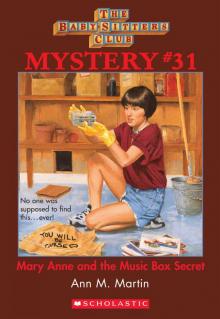 Mary Anne and the Music
Mary Anne and the Music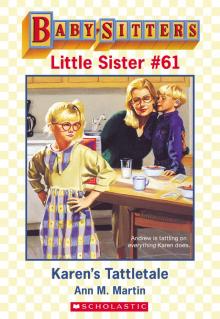 Karen's Tattletale
Karen's Tattletale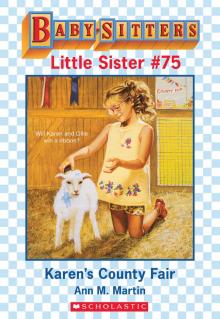 Karen's County Fair
Karen's County Fair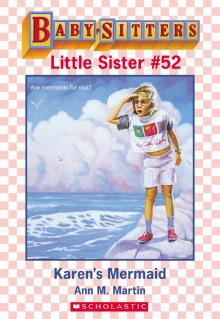 Karen's Mermaid
Karen's Mermaid Snowbound
Snowbound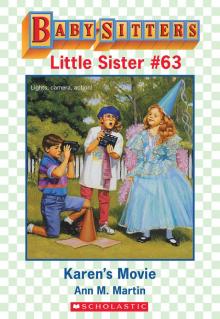 Karen's Movie
Karen's Movie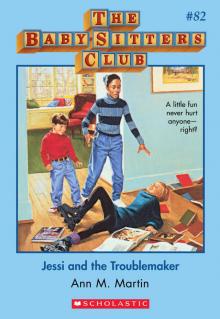 Jessi and the Troublemaker
Jessi and the Troublemaker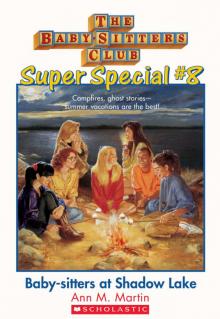 Baby-Sitters at Shadow Lake
Baby-Sitters at Shadow Lake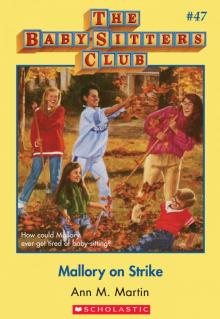 Mallory on Strike
Mallory on Strike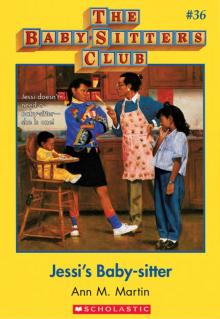 Jessi's Baby-Sitter
Jessi's Baby-Sitter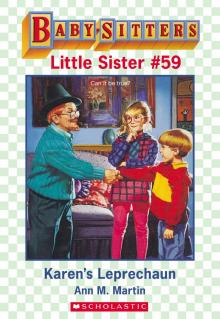 Karen's Leprechaun
Karen's Leprechaun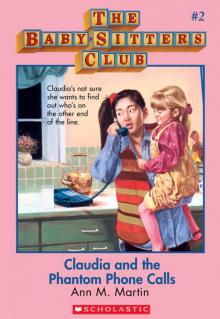 Claudia and the Phantom Phone Calls
Claudia and the Phantom Phone Calls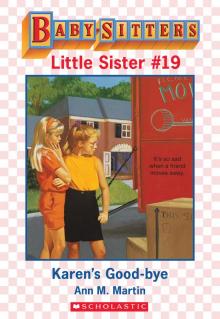 Karen's Good-Bye
Karen's Good-Bye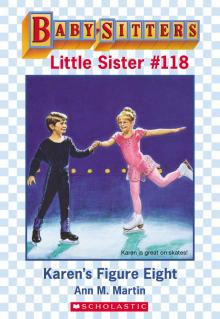 Karen's Figure Eight
Karen's Figure Eight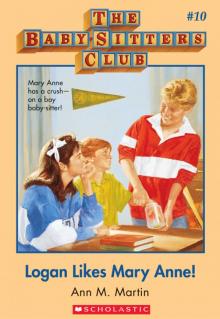 Logan Likes Mary Anne!
Logan Likes Mary Anne!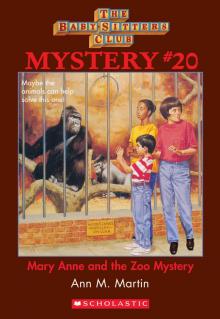 Mary Anne and the Zoo Mystery
Mary Anne and the Zoo Mystery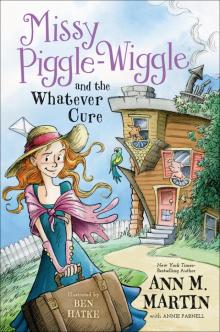 Missy Piggle-Wiggle and the Whatever Cure
Missy Piggle-Wiggle and the Whatever Cure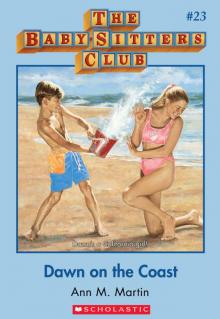 Dawn on the Coast
Dawn on the Coast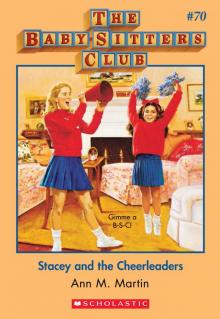 Stacey and the Cheerleaders
Stacey and the Cheerleaders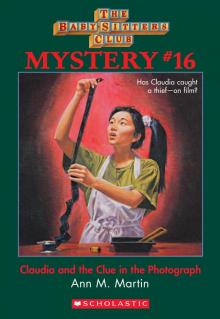 Claudia and the Clue in the Photograph
Claudia and the Clue in the Photograph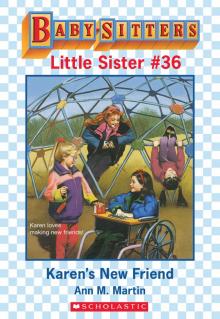 Karen's New Friend
Karen's New Friend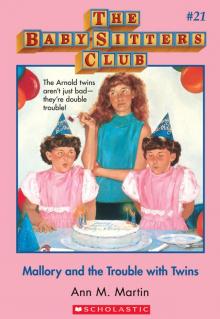 Mallory and the Trouble With Twins
Mallory and the Trouble With Twins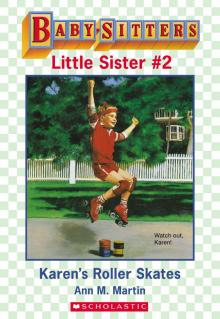 Karen's Roller Skates
Karen's Roller Skates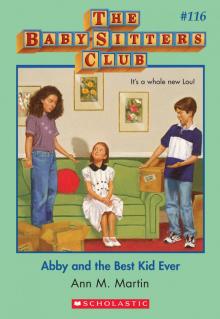 Abby and the Best Kid Ever
Abby and the Best Kid Ever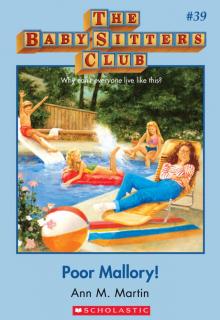 Poor Mallory!
Poor Mallory!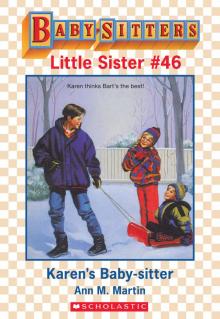 Karen's Witch
Karen's Witch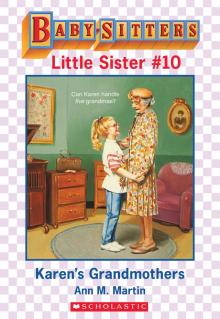 Karen's Grandmothers
Karen's Grandmothers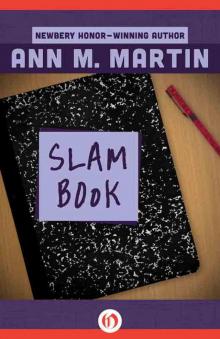 Slam Book
Slam Book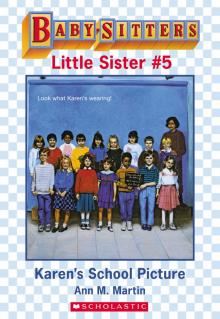 Karen's School Picture
Karen's School Picture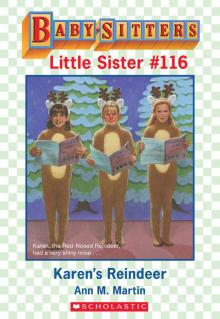 Karen's Reindeer
Karen's Reindeer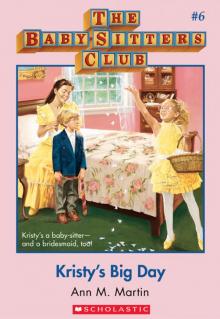 Kristy's Big Day
Kristy's Big Day The Long Way Home
The Long Way Home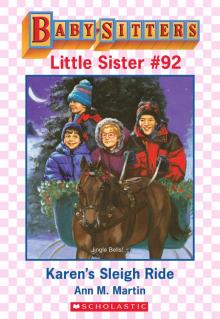 Karen's Sleigh Ride
Karen's Sleigh Ride On Christmas Eve
On Christmas Eve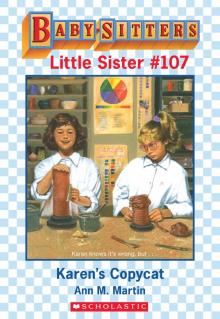 Karen's Copycat
Karen's Copycat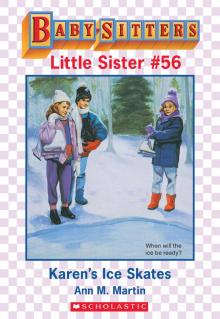 Karen's Ice Skates
Karen's Ice Skates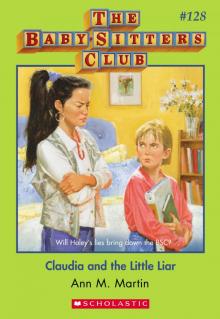 Claudia and the Little Liar
Claudia and the Little Liar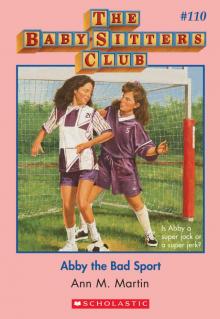 Abby the Bad Sport
Abby the Bad Sport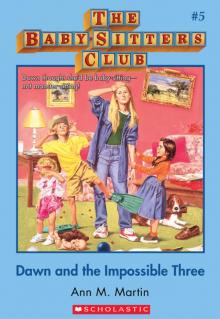 The Baby-Sitters Club #5: Dawn and the Impossible Three
The Baby-Sitters Club #5: Dawn and the Impossible Three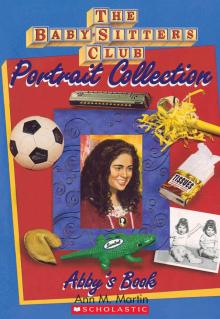 Abby's Book
Abby's Book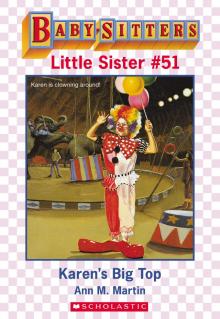 Karen's Big Top
Karen's Big Top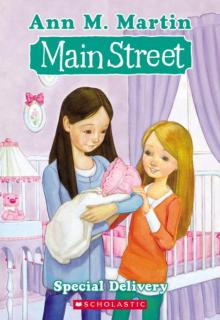 Main Street #8: Special Delivery
Main Street #8: Special Delivery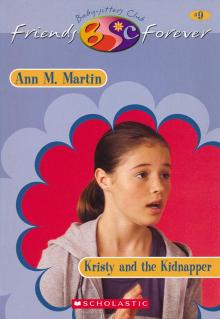 Kristy and the Kidnapper
Kristy and the Kidnapper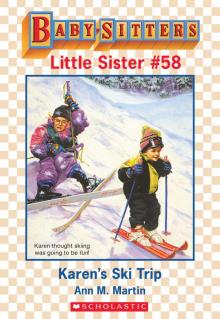 Karen's Ski Trip
Karen's Ski Trip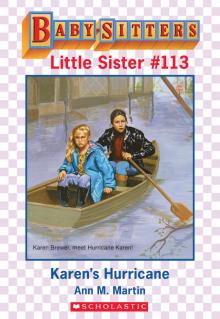 Karen's Hurricane
Karen's Hurricane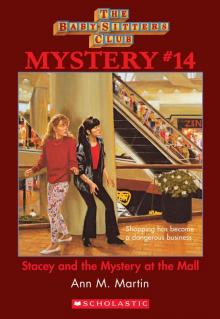 Stacey and the Mystery at the Mall
Stacey and the Mystery at the Mall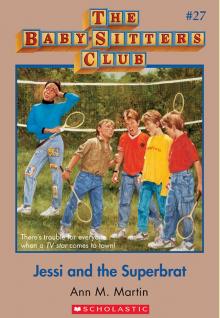 Jessi and the Superbrat
Jessi and the Superbrat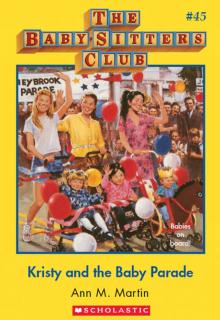 Kristy and the Baby Parade
Kristy and the Baby Parade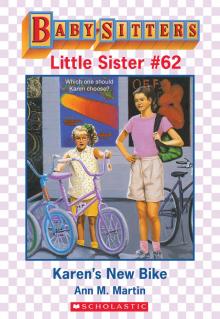 Karen's New Bike
Karen's New Bike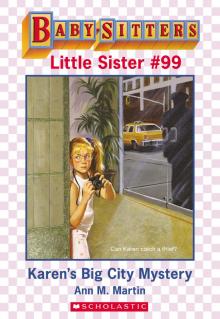 Karen's Big City Mystery
Karen's Big City Mystery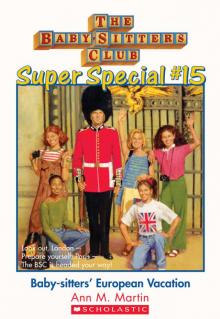 Baby-Sitters' European Vacation
Baby-Sitters' European Vacation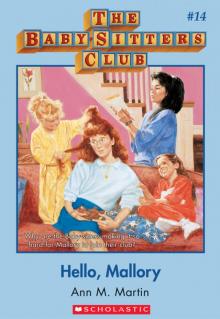 Hello, Mallory
Hello, Mallory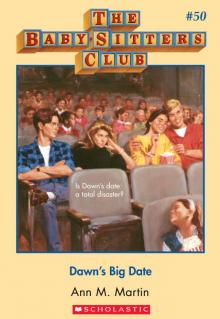 Dawn's Big Date
Dawn's Big Date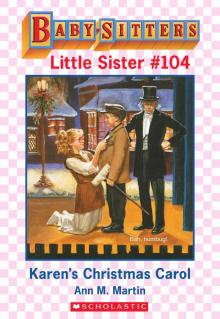 Karen's Christmas Carol
Karen's Christmas Carol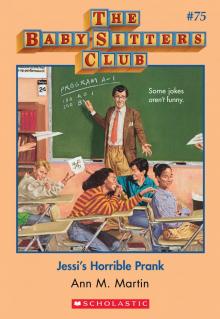 Jessi's Horrible Prank
Jessi's Horrible Prank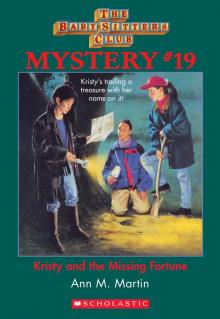 Kristy and the Missing Fortune
Kristy and the Missing Fortune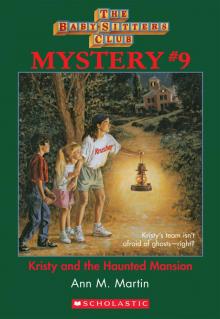 Kristy and the Haunted Mansion
Kristy and the Haunted Mansion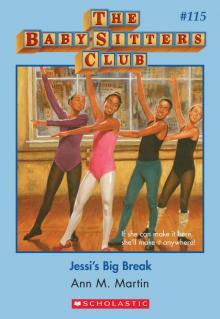 Jessi's Big Break
Jessi's Big Break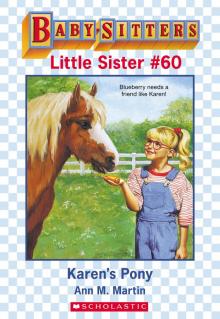 Karen's Pony
Karen's Pony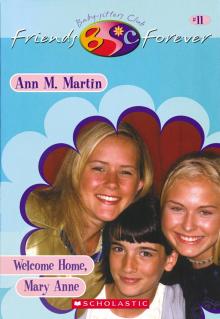 Welcome Home, Mary Anne
Welcome Home, Mary Anne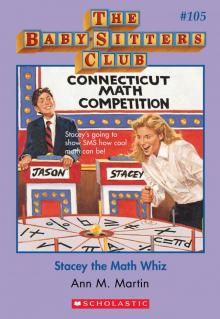 Stacey the Math Whiz
Stacey the Math Whiz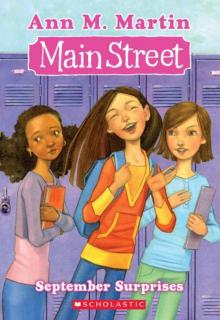 September Surprises
September Surprises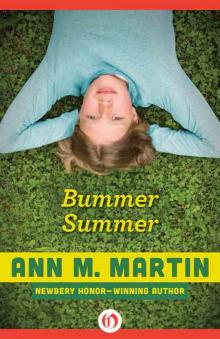 Bummer Summer
Bummer Summer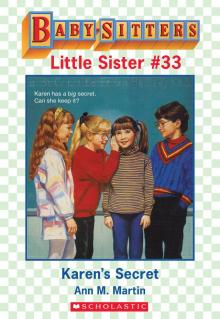 Karen's Secret
Karen's Secret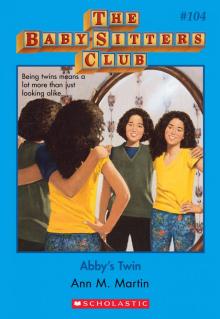 Abby's Twin
Abby's Twin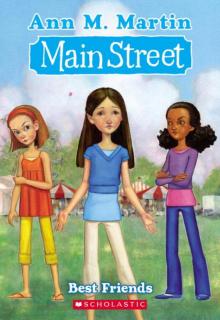 Main Street #4: Best Friends
Main Street #4: Best Friends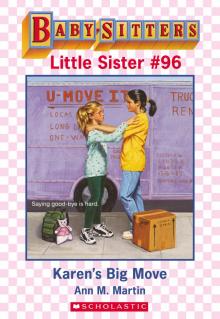 Karen's Big Move
Karen's Big Move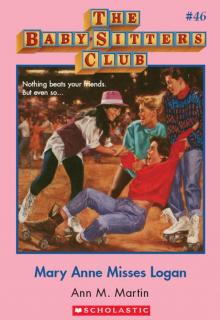 Mary Anne Misses Logan
Mary Anne Misses Logan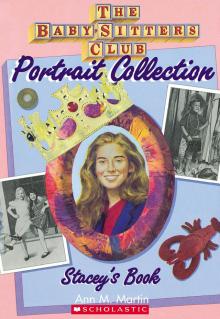 Stacey's Book
Stacey's Book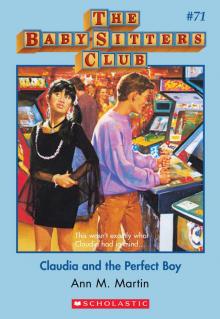 Claudia and the Perfect Boy
Claudia and the Perfect Boy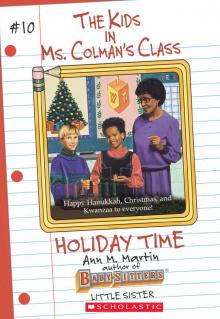 Holiday Time
Holiday Time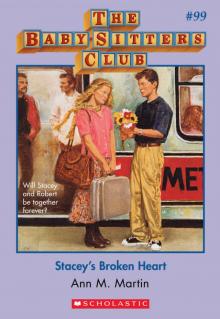 Stacey's Broken Heart
Stacey's Broken Heart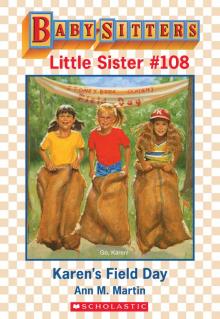 Karen's Field Day
Karen's Field Day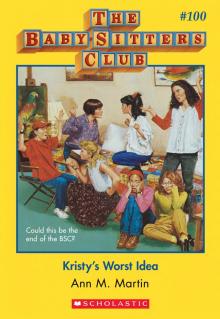 Kristy's Worst Idea
Kristy's Worst Idea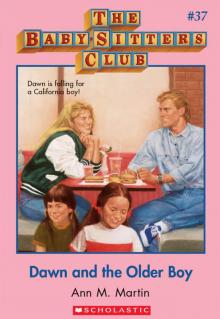 Dawn and the Older Boy
Dawn and the Older Boy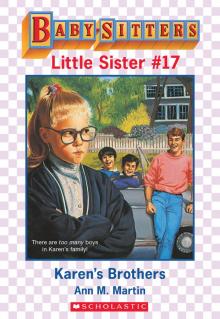 Karen's Brothers
Karen's Brothers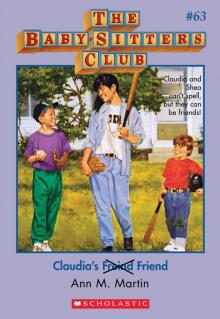 Claudia's Friend
Claudia's Friend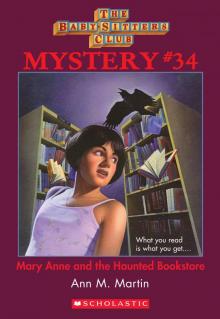 Mary Anne and the Haunted Bookstore
Mary Anne and the Haunted Bookstore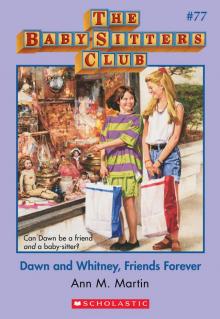 Dawn and Whitney, Friends Forever
Dawn and Whitney, Friends Forever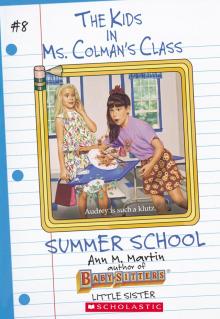 Summer School
Summer School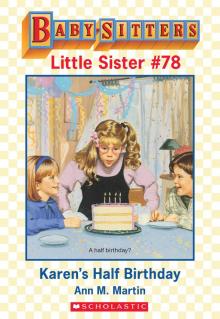 Karen's Birthday
Karen's Birthday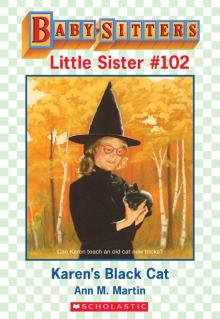 Karen's Black Cat
Karen's Black Cat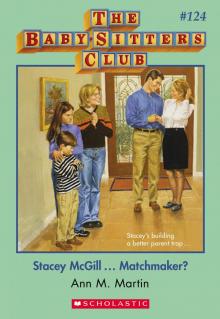 Stacey McGill... Matchmaker?
Stacey McGill... Matchmaker?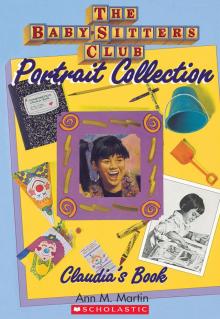 Claudia's Book
Claudia's Book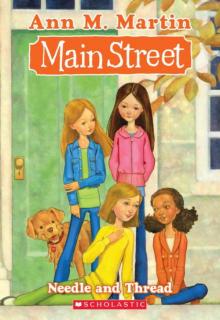 Main Street #2: Needle and Thread
Main Street #2: Needle and Thread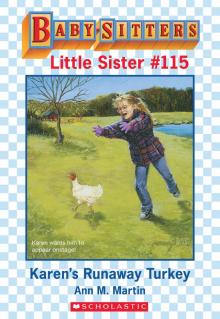 Karen's Runaway Turkey
Karen's Runaway Turkey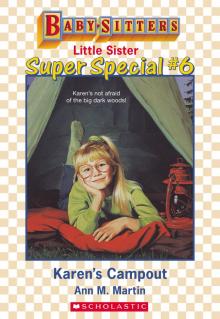 Karen's Campout
Karen's Campout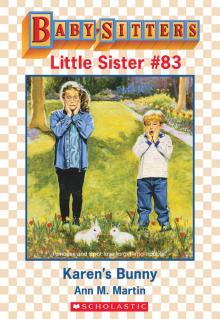 Karen's Bunny
Karen's Bunny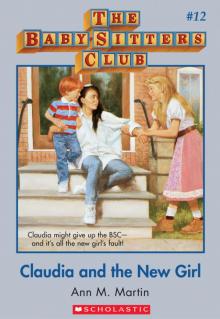 Claudia and the New Girl
Claudia and the New Girl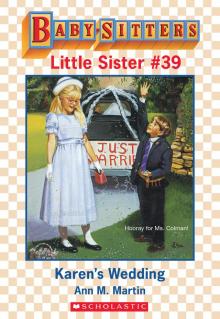 Karen's Wedding
Karen's Wedding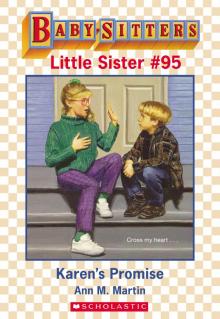 Karen's Promise
Karen's Promise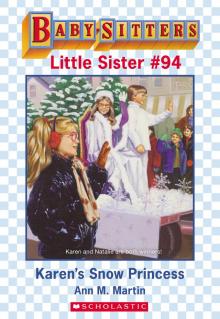 Karen's Snow Princess
Karen's Snow Princess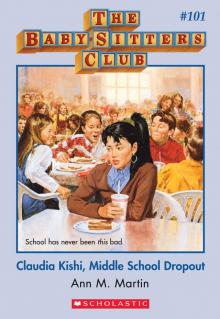 Claudia Kishi, Middle School Dropout
Claudia Kishi, Middle School Dropout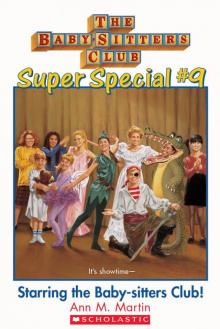 Starring the Baby-Sitters Club!
Starring the Baby-Sitters Club!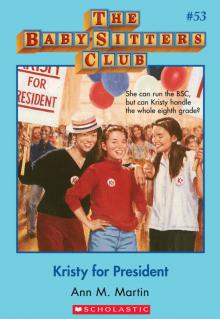 Kristy for President
Kristy for President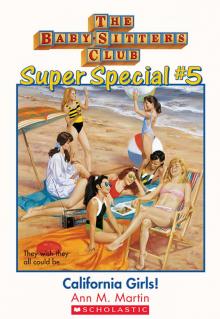 California Girls!
California Girls!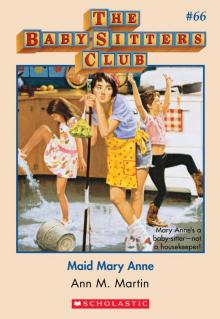 Maid Mary Anne
Maid Mary Anne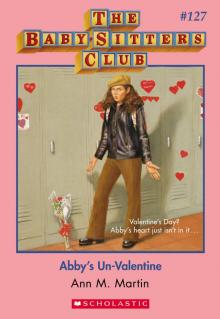 Abby's Un-Valentine
Abby's Un-Valentine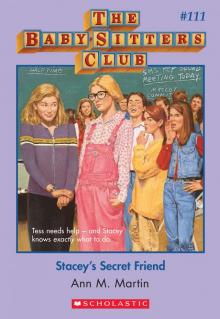 Stacey's Secret Friend
Stacey's Secret Friend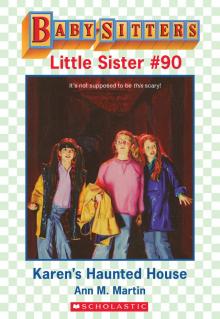 Karen's Haunted House
Karen's Haunted House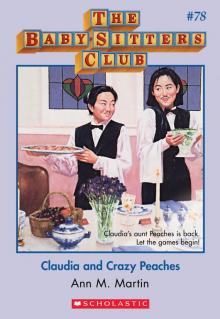 Claudia and Crazy Peaches
Claudia and Crazy Peaches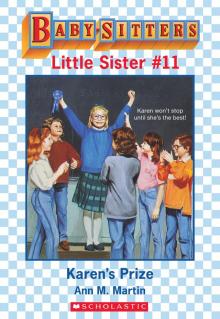 Karen's Prize
Karen's Prize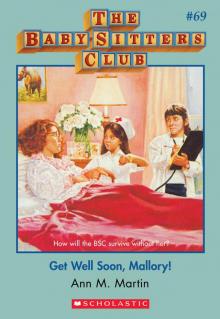 Get Well Soon, Mallory!
Get Well Soon, Mallory!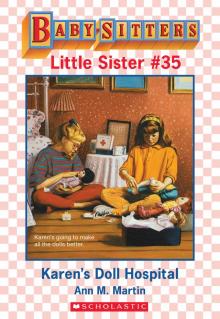 Karen's Doll Hospital
Karen's Doll Hospital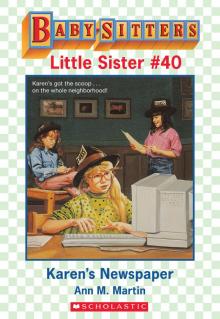 Karen's Newspaper
Karen's Newspaper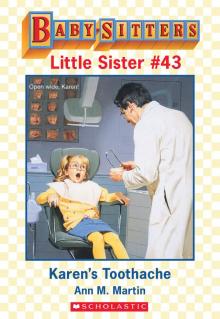 Karen's Toothache
Karen's Toothache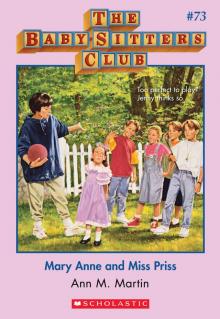 Mary Anne and Miss Priss
Mary Anne and Miss Priss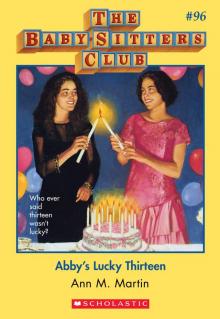 Abby's Lucky Thirteen
Abby's Lucky Thirteen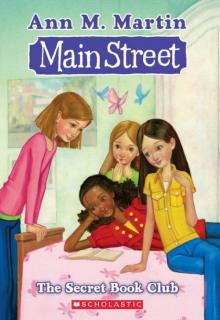 The Secret Book Club
The Secret Book Club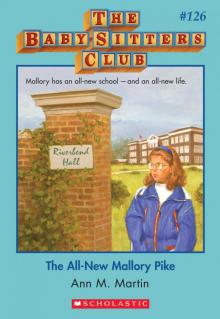 The All-New Mallory Pike
The All-New Mallory Pike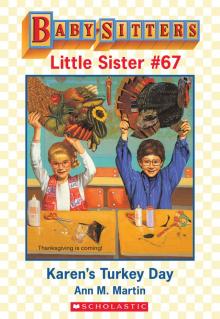 Karen's Turkey Day
Karen's Turkey Day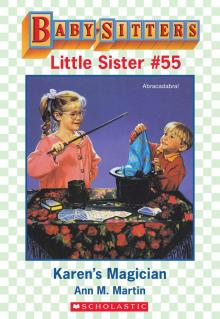 Karen's Magician
Karen's Magician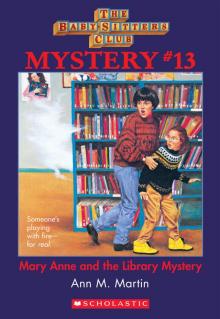 Mary Anne and the Library Mystery
Mary Anne and the Library Mystery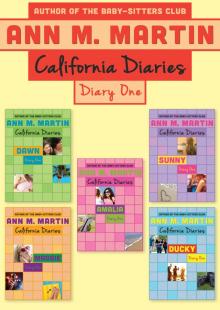 Diary One: Dawn, Sunny, Maggie, Amalia, and Ducky
Diary One: Dawn, Sunny, Maggie, Amalia, and Ducky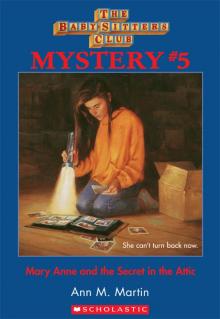 Mary Anne and the Secret in the Attic
Mary Anne and the Secret in the Attic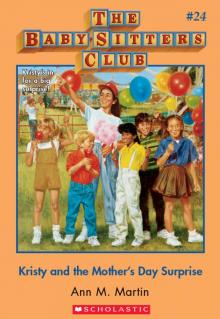 Kristy and the Mother's Day Surprise
Kristy and the Mother's Day Surprise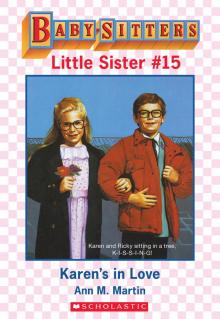 Karen's in Love
Karen's in Love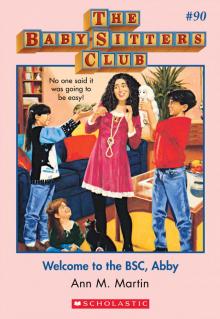 Welcome to the BSC, Abby
Welcome to the BSC, Abby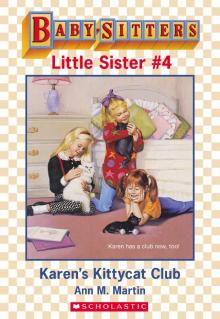 Karen's Kittycat Club
Karen's Kittycat Club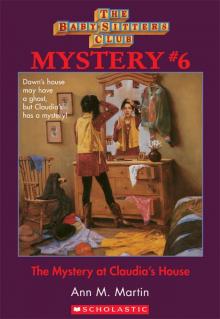 The Mystery at Claudia's House
The Mystery at Claudia's House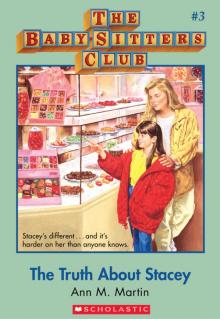 The Truth About Stacey
The Truth About Stacey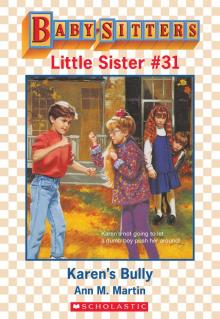 Karen's Bully
Karen's Bully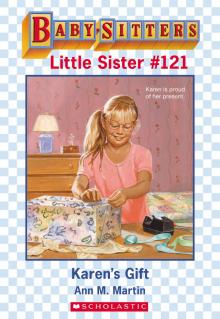 Karen's Gift
Karen's Gift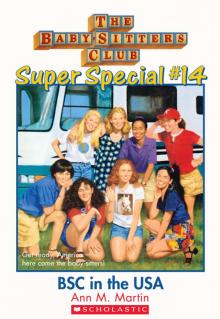 BSC in the USA
BSC in the USA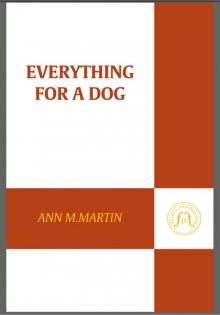 Everything for a Dog
Everything for a Dog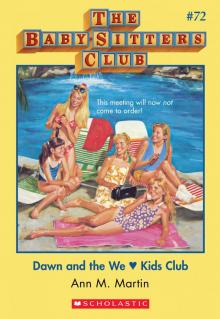 Dawn and the We Love Kids Club
Dawn and the We Love Kids Club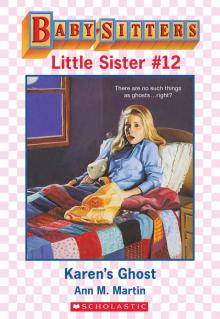 Karen's Ghost
Karen's Ghost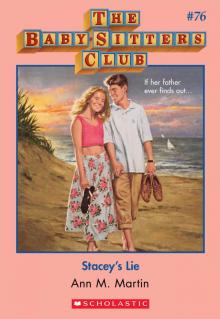 Stacey's Lie
Stacey's Lie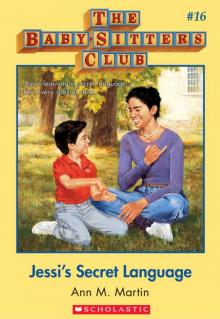 Jessi's Secret Language
Jessi's Secret Language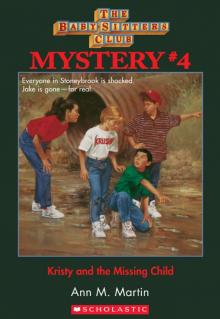 Kristy and the Missing Child
Kristy and the Missing Child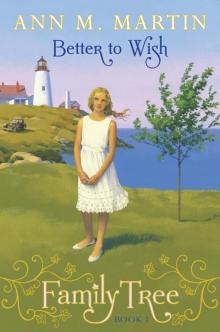 Better to Wish
Better to Wish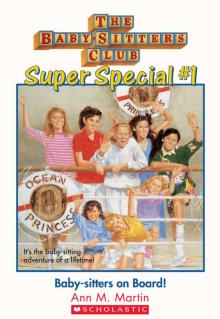 Baby-Sitters on Board!
Baby-Sitters on Board!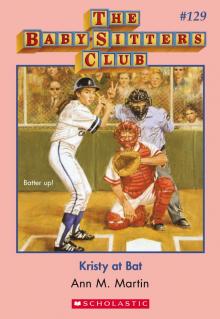 Kristy at Bat
Kristy at Bat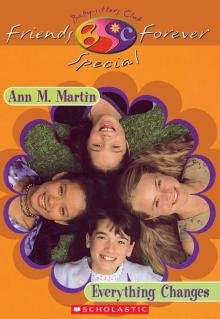 Everything Changes
Everything Changes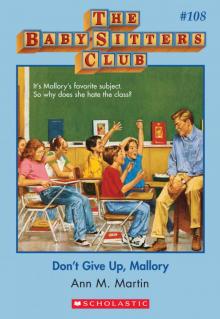 Don't Give Up, Mallory
Don't Give Up, Mallory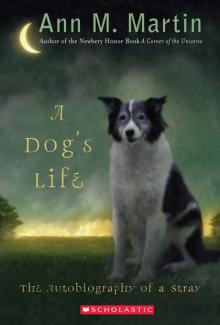 A Dog's Life: The Autobiography of a Stray
A Dog's Life: The Autobiography of a Stray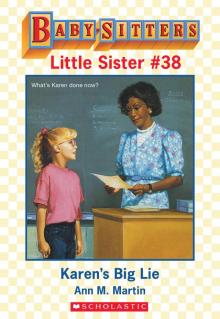 Karen's Big Lie
Karen's Big Lie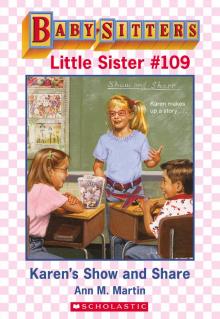 Karen's Show and Share
Karen's Show and Share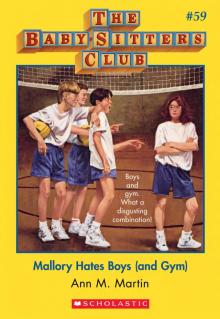 Mallory Hates Boys (and Gym)
Mallory Hates Boys (and Gym)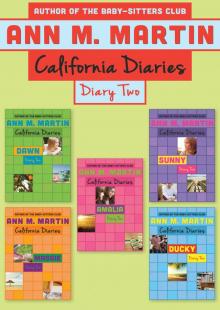 Diary Two: Dawn, Sunny, Maggie, Amalia, and Ducky
Diary Two: Dawn, Sunny, Maggie, Amalia, and Ducky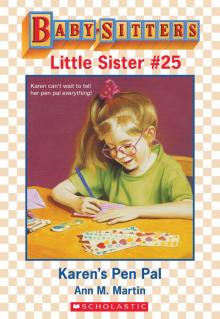 Karen's Pen Pal
Karen's Pen Pal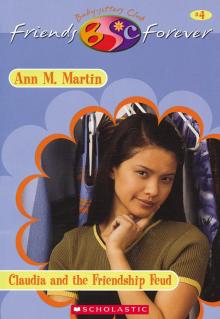 Claudia and the Friendship Feud
Claudia and the Friendship Feud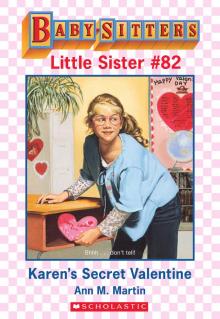 Karen's Secret Valentine
Karen's Secret Valentine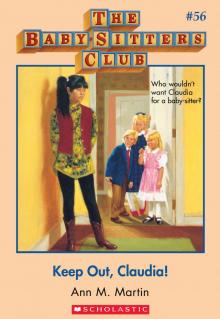 Keep Out, Claudia!
Keep Out, Claudia!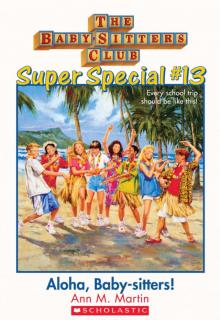 Aloha, Baby-Sitters!
Aloha, Baby-Sitters!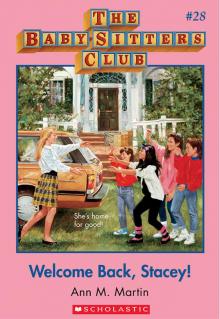 Welcome Back, Stacey
Welcome Back, Stacey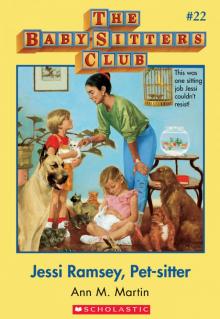 Jessi Ramsey, Pet-Sitter
Jessi Ramsey, Pet-Sitter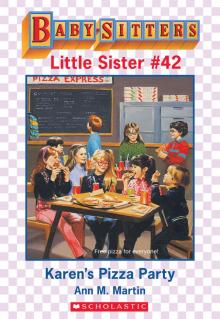 Karen's Pizza Party
Karen's Pizza Party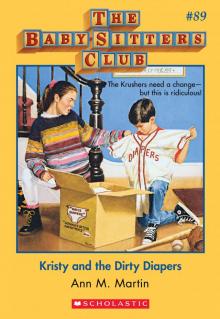 Kristy and the Dirty Diapers
Kristy and the Dirty Diapers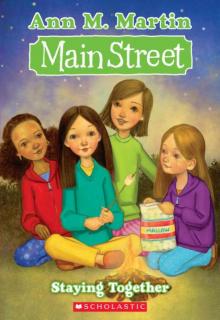 Staying Together
Staying Together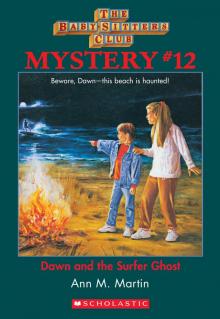 Dawn and the Surfer Ghost
Dawn and the Surfer Ghost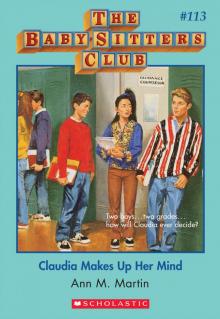 Claudia Makes Up Her Mind
Claudia Makes Up Her Mind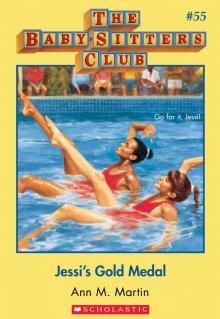 Jessi's Gold Medal
Jessi's Gold Medal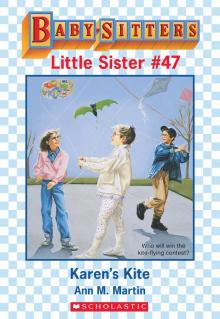 Karen's Kite
Karen's Kite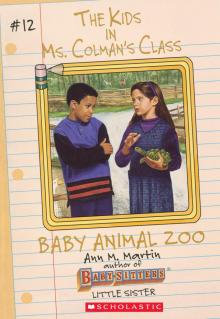 Baby Animal Zoo
Baby Animal Zoo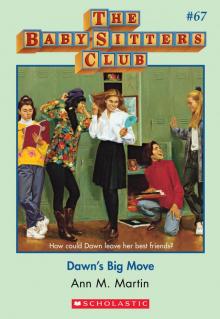 Dawn's Big Move
Dawn's Big Move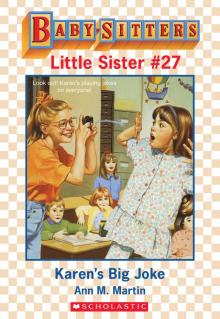 Karen's Big Joke
Karen's Big Joke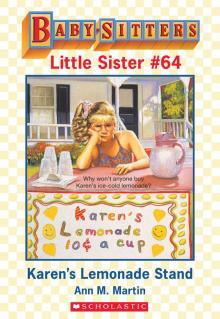 Karen's Lemonade Stand
Karen's Lemonade Stand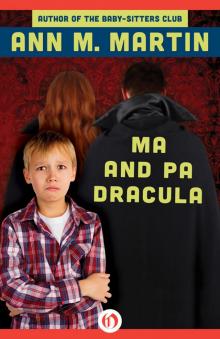 Ma and Pa Dracula
Ma and Pa Dracula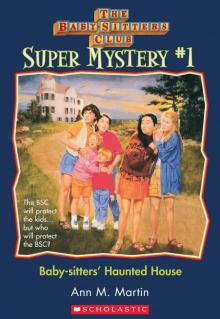 Baby-Sitters' Haunted House
Baby-Sitters' Haunted House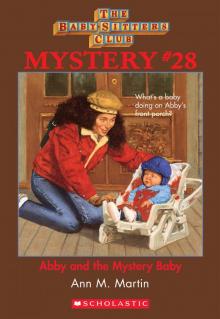 Abby and the Mystery Baby
Abby and the Mystery Baby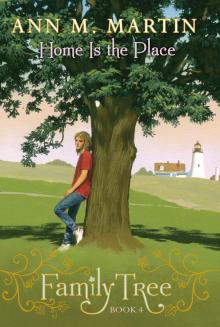 Home Is the Place
Home Is the Place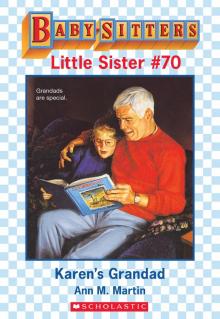 Karen's Grandad
Karen's Grandad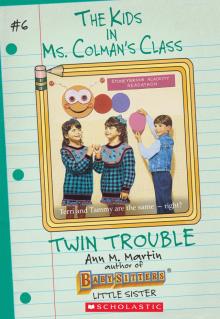 Twin Trouble
Twin Trouble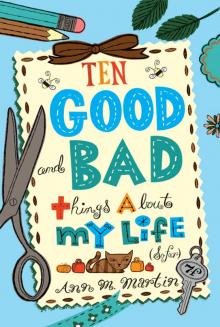 Ten Good and Bad Things About My Life (So Far)
Ten Good and Bad Things About My Life (So Far)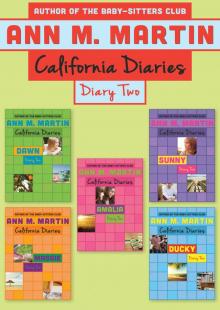 Diary Two
Diary Two Baby-Sitters Club 027
Baby-Sitters Club 027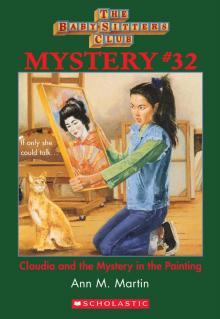 Claudia and the Mystery Painting
Claudia and the Mystery Painting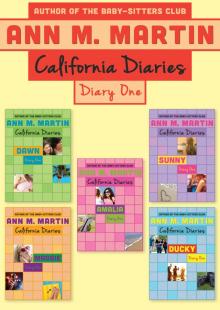 Diary One
Diary One Baby-Sitters Club 037
Baby-Sitters Club 037 Baby-Sitters Club 028
Baby-Sitters Club 028 Baby-Sitters Club 085
Baby-Sitters Club 085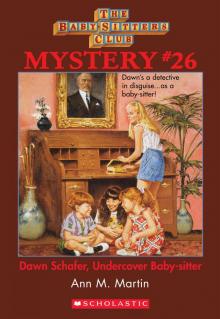 Dawn Schaffer Undercover Baby-Sitter
Dawn Schaffer Undercover Baby-Sitter Jessi's Babysitter
Jessi's Babysitter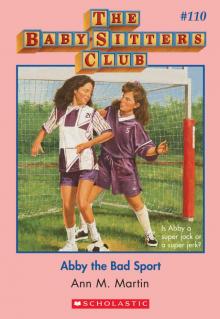 The Baby-Sitters Club #110: Abby the Bad Sport (Baby-Sitters Club, The)
The Baby-Sitters Club #110: Abby the Bad Sport (Baby-Sitters Club, The) Karen's Little Sister
Karen's Little Sister Baby-Sitters Club 058
Baby-Sitters Club 058 Claudia And The Genius On Elm St.
Claudia And The Genius On Elm St.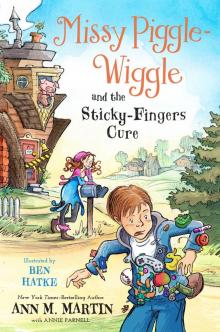 Missy Piggle-Wiggle and the Sticky-Fingers Cure
Missy Piggle-Wiggle and the Sticky-Fingers Cure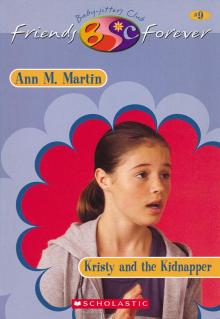 Kristy and Kidnapper
Kristy and Kidnapper Baby-Sitters Club 041
Baby-Sitters Club 041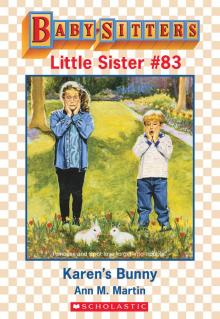 Karen's Bunny Trouble
Karen's Bunny Trouble Baby-Sitters Club 032
Baby-Sitters Club 032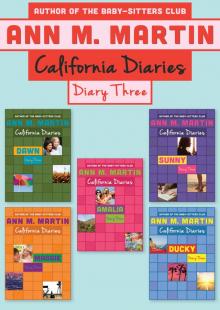 Diary Three
Diary Three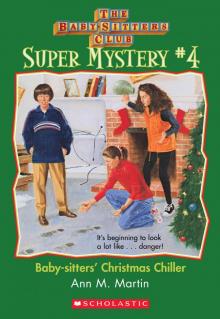 Christmas Chiller
Christmas Chiller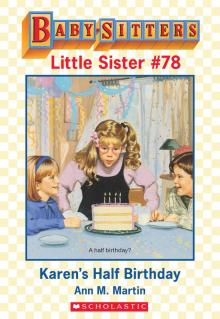 Karen's Half-Birthday
Karen's Half-Birthday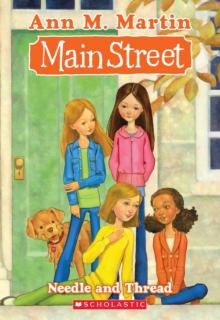 Needle and Thread
Needle and Thread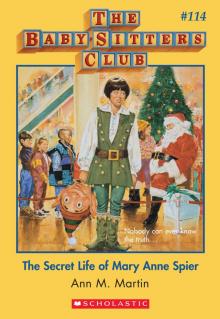 Secret Life of Mary Anne Spier
Secret Life of Mary Anne Spier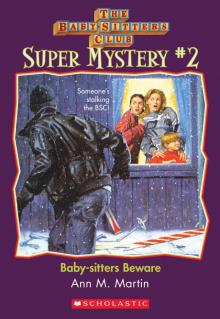 Baby-Sitters Beware
Baby-Sitters Beware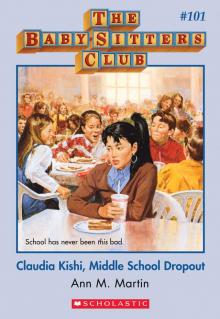 Claudia Kishi, Middle School Drop-Out
Claudia Kishi, Middle School Drop-Out Logan Likes Mary Anne !
Logan Likes Mary Anne ! Baby-Sitters Club 061
Baby-Sitters Club 061 Best Friends
Best Friends Baby-Sitters Club 031
Baby-Sitters Club 031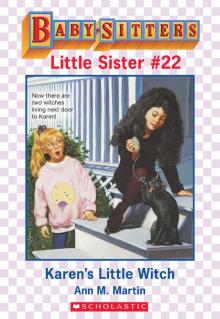 Karen's Little Witch
Karen's Little Witch Jessi Ramsey, Petsitter
Jessi Ramsey, Petsitter Baby-Sitters Club 123
Baby-Sitters Club 123 Baby-Sitters Club 059
Baby-Sitters Club 059 Baby-Sitters Club 033
Baby-Sitters Club 033 Baby-Sitters Club 060
Baby-Sitters Club 060 Baby-Sitters Club 094
Baby-Sitters Club 094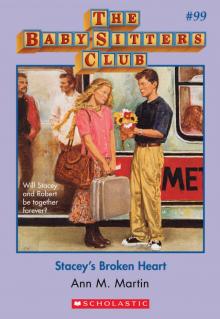 The Baby-Sitters Club #99: Stacey's Broken Heart
The Baby-Sitters Club #99: Stacey's Broken Heart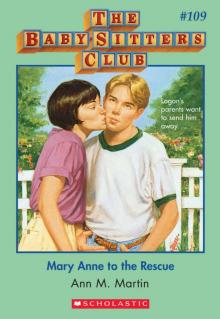 The Baby-Sitters Club #109: Mary Anne to the Rescue (Baby-Sitters Club, The)
The Baby-Sitters Club #109: Mary Anne to the Rescue (Baby-Sitters Club, The) Mystery At Claudia's House
Mystery At Claudia's House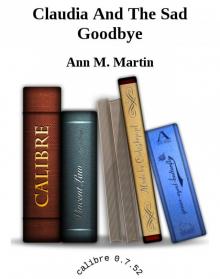 Claudia And The Sad Goodbye
Claudia And The Sad Goodbye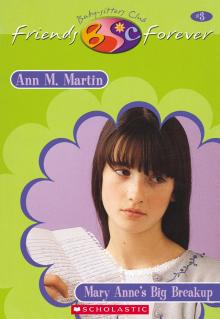 Mary Anne's Big Break-Up
Mary Anne's Big Break-Up Baby-Sitters Club 025
Baby-Sitters Club 025 Baby-Sitters Club 042
Baby-Sitters Club 042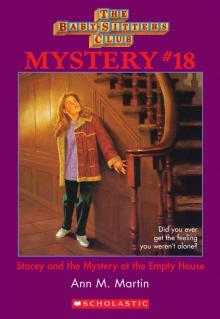 Stacey and the Mystery of the Empty House
Stacey and the Mystery of the Empty House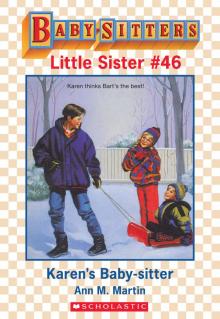 Karen's Baby-Sitter
Karen's Baby-Sitter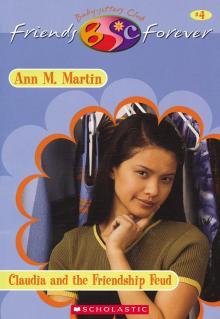 Claudia's Friendship Feud
Claudia's Friendship Feud Baby-Sitters Club 090
Baby-Sitters Club 090 Baby-Sitters Club 021
Baby-Sitters Club 021 Baby-Sitters Club 056
Baby-Sitters Club 056 Baby-Sitters Club 040
Baby-Sitters Club 040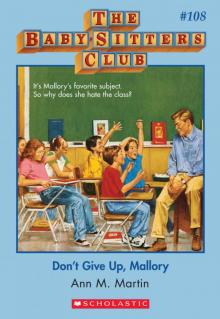 The Baby-Sitters Club #108: Don't Give Up, Mallory (Baby-Sitters Club, The)
The Baby-Sitters Club #108: Don't Give Up, Mallory (Baby-Sitters Club, The)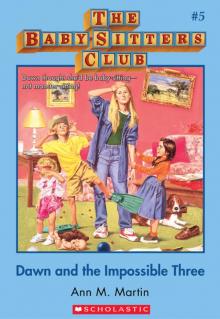 Dawn and the Impossible Three
Dawn and the Impossible Three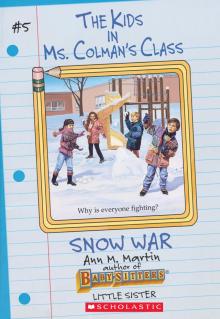 The Snow War
The Snow War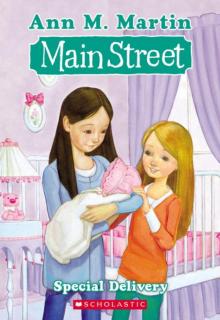 Special Delivery
Special Delivery Baby-Sitters Club 057
Baby-Sitters Club 057 Mary Anne And Too Many Babies
Mary Anne And Too Many Babies Baby-Sitters Club 030
Baby-Sitters Club 030